#GAY (1999 - PRESENT)
Text
Listennnnn to be loved is to be seen
Buffy is SURROUNDED by people who project and project and project some more onto her without ever truly seeing her and just trying to force her to be whatever they want/need her to be often leaving her feeling used, abused, and lonely.
And so while yes on the surface the Buffy bot is icky as hell and obviously irl all of us would be rightfully horrified if that happened to us. This is fictional and with a still evil but trying to be good but with no human soul to help guide him on how to be good Spike - who has been rejected and is honoring that rejection and finding a solution to leave real Buffy alone by giving him a place to put all his feelings for Buffy somewhere that isn’t Buffy herself - programs her so well and therefore showing how well he sees and understands her!! NO ONE ELSE could have programmed that exact Buffy that was believable enough to fool her friends. So yes it’s twisted but this is a vampire falling in love with the slayer if you want completely healthy truly go elsewhere lololol but so the bot is used to show just how well Spike truly understands her and more importantly what he loves about her which given the partner she had right before this was Riley who VERY CLEARLY hated how strong she was and that she was the slayer…
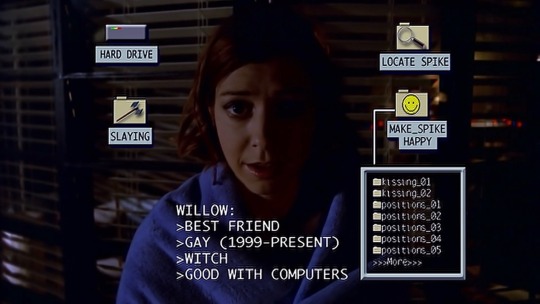
spike is like SHE NEEDS A DEDICATED SLAYER FOLDER
HE PUT THE YEAR WILLOW CAME OUT IN HER BIO 😭😭😭😭 angel and riley truly could never in a million years pay close enough attention to the people in her life that Buffy cares about to add info like that
The choice of “make spike happy” instead of something like “pleasing spike” feels significant because it’s able to encompass a wider range of things including her care for her friends since that seems to be the active folder when she’s accessing information on them. Buffy caring about other people makes him happy even though he’s morally grey at best at this moment 😭 AND TWO KISSING PROGRAMS ARE THE VERY FIRST THINGS IN THAT FOLDER 😭😭😭 he doesn’t just “want to fuck her” like people try to claim he wants to love her 🥲 he wants her kisses like I’m gonna throw up from how disgustingly tender and heartbreaking that is
Buffy bot calls both her and Buffy very pretty and tells Giles he “should listen to the other Buffy because she’s very smart”. Spike made sure the Buffy bot was a Buffy that loved herself and valued her intelligence like I cannot even begin to tell you how NONE of this is your run of the mill making just a sex bot of your crush because not being able to have sex with them upsets you. He wants to love her because he knows she needs it as much as he wants to give it to her
We have this moment where Buffy bot has finally found Spike who she’s been looking for and worried about the whole time and seemingly only cares about him and no one else and she sees he’s SEVERELY injured yet when Giles calls for help Buffy bot responds at the same time as Buffy does and runs to his aide leaving Spike like she’s still just so BUFFY at her core even if the superficial aspects have been changed 😭
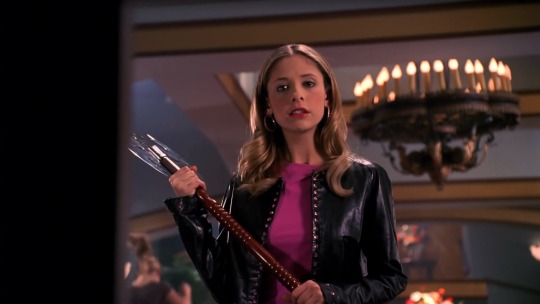
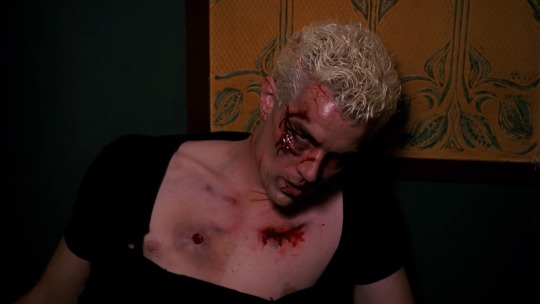
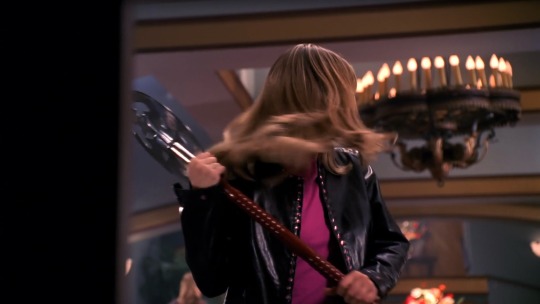
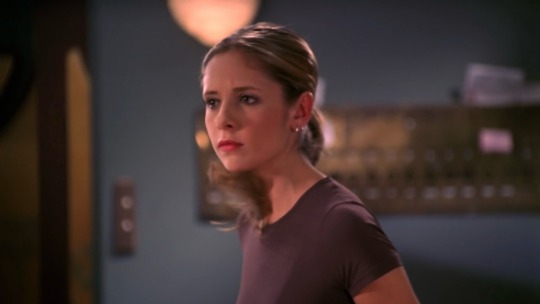
if we compare this moment to the one in something blue where xander calls out for help in the crypt in an IDENTICAL situation yet ACTUAL BUFFY just continues to make out with Spike when he’s not even injured at all 💀 like Spike didn’t even give Buffy bot the “extra love sick” component Buffy herself exhibits for him on multiple occasions 😭
and of course - WE END WITH THIS KISS AND THE WAY SHE’S FUCKING LOOKING AT HIM BRO 😩 she’s like holy shit he was for real when he said he loved me no one has ever done anything like this for me while simultaneously showing how COMPLETELY loyal and obsessed they are and how well they know and love all of me AND my sister like
‼️I CAN DEPEND ON HIM‼️
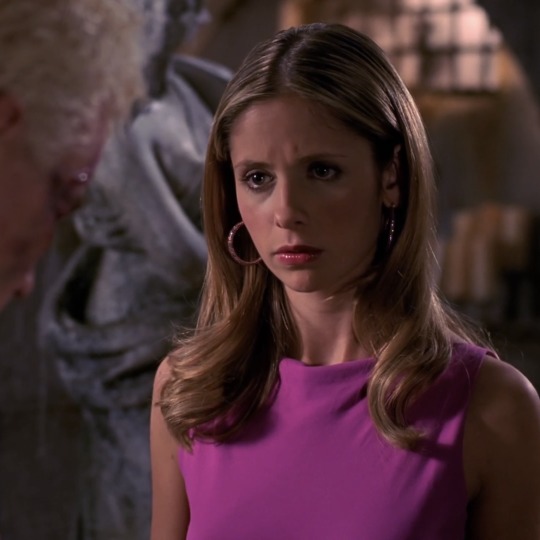
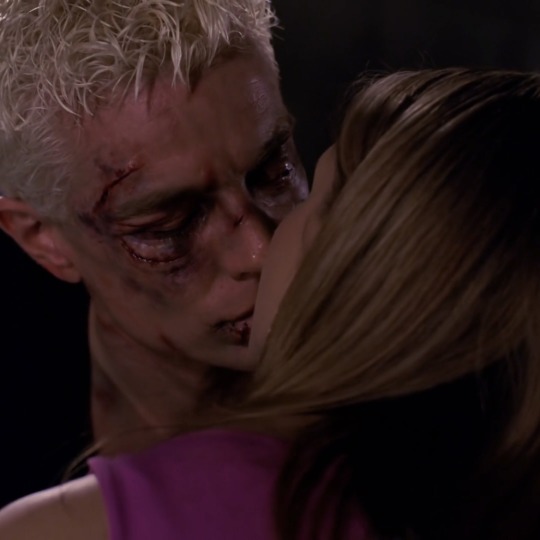
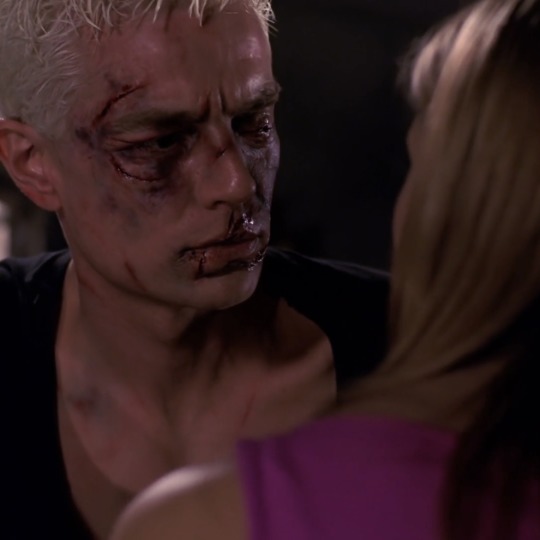
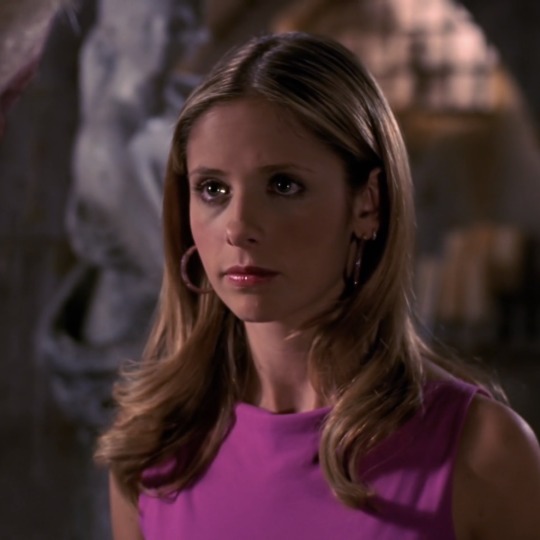
So close to death even Xander is feeling sympathy for him yet clocks IMMEDIATELY it’s her and she’s just like hi 🥹 yes it’s me, I really just did that. I see you and what you did for me. HAVE HOPE KEEP TRYING DONT GIVE UP.
If Buffy loves you she forgives you pretty easily and I personally think that’s what we’re seeing here with Spike like kissing him in the same ep she learns of the Buffy bot is low key CRAZY 😹 but truly people who have done less for her have done far worse!!! The bot kept dawn and tara from being taken instead and he proved he would protect both of them with his life and like she already loves him which is why she even went for the kiss she was like REALLY THE SITUATION CALLS FOR IT WHAT’S A GIRL TO DO 🤷🏼♀️
#this post all started literally just from noticing the gay 1999-present 💀#spuffy#embarassing freak couple#spike and buffy#spike x buffy#spuffy season 5
283 notes
·
View notes
Text
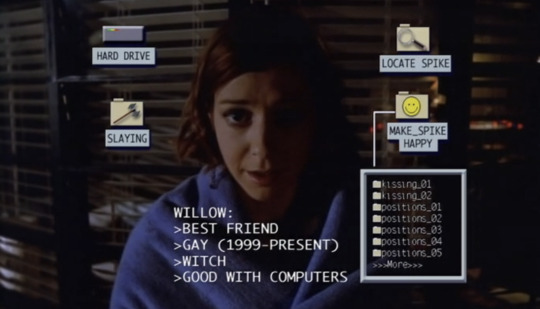
funniest image of all time
#i cant stand this show for real#the fact this is just. a screen shot#serioulsy#GAY (1999 - PRESENT)#btvs
67 notes
·
View notes
Text







#dare i present you: clamp gays#clamp#tsubasa chronicle#x/1999#tokyo babylon#xxxholic#kurofai#douwata#seisub#fuukam#last one tho it looks like they're in middle of make out season instead of break up
305 notes
·
View notes
Photo

Shahar Tavoch
Gender: Male
Sexuality: Gay
DOB: 18 March 1999
Ethnicity: Ashkenazi Jewish
Nationality: Israeli
Occupation: Actor, voice actor, singer, presenter
#Shahar Tavoch#lgbt#lgbtq#lgbt people#mlm#male#gay#1999#jewish#ashkenazi jewish#Israeli#actor#voice actor#singer#presenter
39 notes
·
View notes
Text
the buffybot's info on willow including 'gay (1999-present)' 😭
#obviously buffybot is like. many levels of gross. but she as a character aside from the reason for her creation is like. very funny.#anyway i am today feeling very grateful for surviving 'the body'. i had my big cry and now i can laugh about gay (1999-present)#season 5 truly is a rollercoaster#nia watches btvs
6 notes
·
View notes
Text
Happy Pride month to all Jews and our true allies.
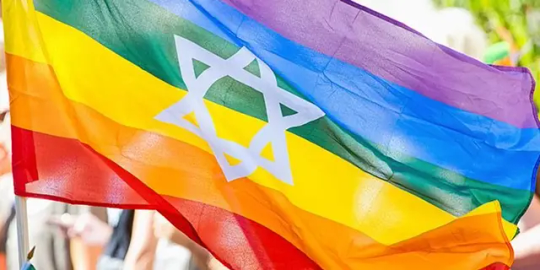
On this occasion, as someone who used to volunteer for the Jerusalem Open House (the gay community center) let me offer you a bit of info about our country's LGBTQ history (and correct some anti-Israel distortions).
This is Chaim (Herman) Cohen.
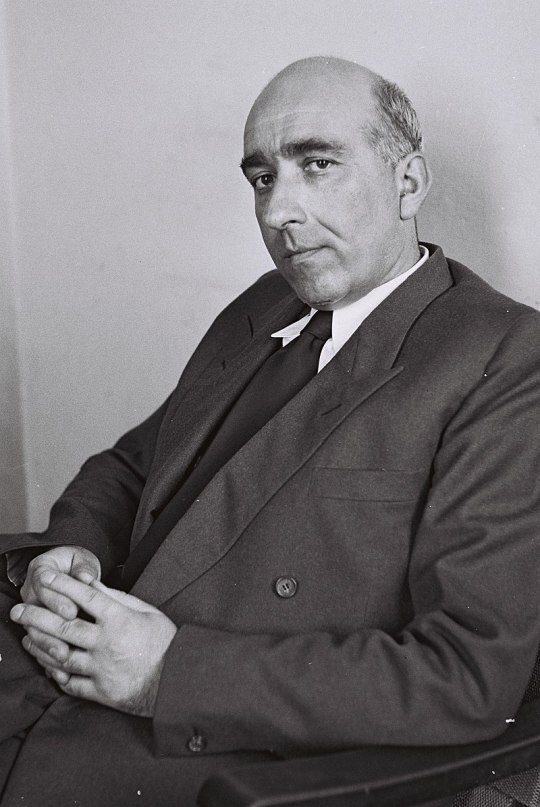
He was born in Germany in 1911, and came to Israel in 1930, to study torah at a yeshiva here. Inspired by his Jewish studies, he decided to turn to the study of law, returning to Germany for that goal and to get married. In 1933, with the rise of the Nazis to power in Germany, he decided to move to Israel permanently. In that sense, he's considered a refugee and Holocaust survivor. His younger brother Leo was murdered by the Nazis.
In 1950, he was appointed Israel's attorney general. In this role, he came across an anti-sodomy law passed by the British Mandate in 1936 (which prohibited all oral and anal sex, including between two men), and which the State of Israel automatically inherited once it was founded in 1948 (source in Hebrew). First he wanted to cancel it, but his jurisdiction fell short of that. As it was within his authority to instruct the Israeli police and state prosecution to ignore it, he did so in 1953. He explained his instruction:
"I thought it was my duty not to uphold a law, which I saw as immoral. [...] And if you should ask, in what is the immorality of the law prohibiting intercourse between men, I will reply to you that such a law against any consenting and private contact between adults contradicts the freedom of man over his own body, and depriving this freedom is a grave infringement against one of the basic human rights."
For comparison's sake, in March 1952, Alan Turing (who saved countless lives for the UK and the allies during WWII) was brought to trial for homosexual consensual private acts, was convicted, and his security clearance was revoked.
In 1978, a special committee of the Knesset (Israel's parliament) recommended several changes to laws addressing various sexual acts, including a recommendation to cancel this anti-sodomy law. In 1980, Israel's first right wing government, under the leadership of Prime Minister Menachem Begin, accepted the committee's recommendations with a corresponding bill (which eventually didn't pass). The bill was presented a second time in 1986, and was passed into law in 1988, decriminalizing same-sex intercourse in Israel (source in Hebrew).
For comparison's sake, in 1990, there were still over 110 jurisdictions in the world criminalizing homosexuality in the world. In the 2020's, RIGHT NOW, there are over 60 that still do.

This is Dr. Doron Maizel (may his memory be a blessing) on the left, with his partner Adir Steiner.
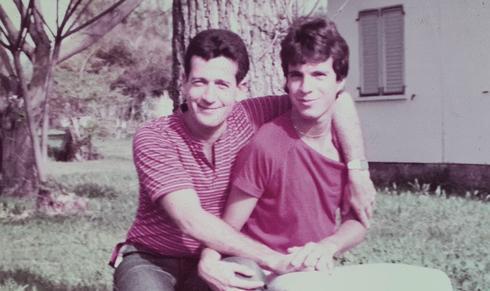
Doron was an army doctor. He was married to a woman with whom he had 3 daughters, before coming out to her in the late 1970's, getting a divorce and eventually openly moving in with his partner Adir. They were together since 1983. Being open about his sexual orientation meant that while Doron was allowed to serve, the same notion that gay men are a security threat (which was applied to Alan Turing), and therefore can't be allowed to serve in top/secret posts in the army, was to stop the promotion that he was about to get. Doron went to visit Ariel Sharon (at the time, Israel's right wing Security Minister, who's in charge of the army) in the latter's private home. IDK what was said in that meeting, but after that, Adir underwent the security check that all partners of a high ranking army officer do, and then Doron got his promotion. When Doron passed away in 1991 from cancer, Adir demanded to be and was recognized as an army widower. Doron's official army commemoration page states, "Left behind a mother, three daughters, a brother and a boyfriend."
Here's Adir with Doron's picture during a 2012 interview:
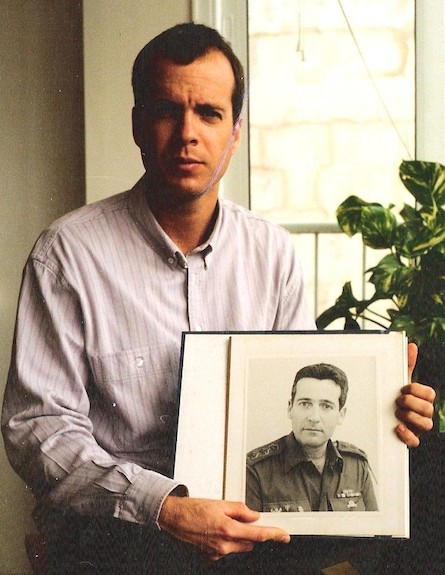
In 1993, the army order that were meant to prevent Doron and other gay soldiers from serving in certain posts was officially canceled. In 1999, a soldier born as male asked to serve as a woman, because that's what she actually was (this would have made this soldier's service shorter, and in that sense "cost" the army). The request was accepted, and since then, trans soldiers serve in the gender they identify with.
The story of Israel's LGBTQ rights isn't only glitter and fairies. Just like I can talk about a lot of progress that the state made in equalizing our rights in many domains (because I have), I could also talk about the rights we still don't have (because I've done that, too). The situation here isn't perfect (though as far as I'm aware, it isn't anywhere in the world, there are at least a few rights denied to the queer community in every country I know of). But when I look at our history, I feel like Israel isn't just one of the more queer-friendly countries in the world, it was also at certain moments at the very forefront of the struggle to recognizing queer people as deserving of equal treatment.
Which is maybe the most instinctual reason for my fury at the form of the Israel's demonization using the false notion of "pink washing." It is DERANGED to think Chaim Cohen, in 1953, gave his pro-gay instruction in relation to an occupation that Israel wasn't being blamed of until after the Six Day War in 1967, and which didn't gain attention from the regular people (as opposed to foreign politicians, who didn't give a shit about Israel's record on gay rights) until the Derben Conference in 2000. Not to mention how the idea that having a good gay rights record is something a country can brag about is probably even younger than that conference.
The pink washing accusation is de-humanizing. It suggests that it can't be that Israelis simply have a set of values which happens to align with the west's when it comes to the gay community (or women's rights, or ecological awareness, or freedom of speech, or any of the other positives Israel has, which position it high in the Freedom Index, and which anti-Israel activists label "washing" with one color or another). No, the history of these fields in the Jewish state is all about what non-Jews will say about us! It's like you can't fathom that we have an existence of our own, and minds of our own, and desires and wants and struggles of our own, and not everything is centered about what you think of us.
And the source of this self-centered thinking seems to connect with an inability to accept the Jewish state as anything other than the ultimate evil. Because Israel has to be the supervillain of the story, then it can't have a single positive. Everything about it has to be black, otherwise that challenges the black and white narrative that's been developed to demonize the Jewish state. So if it is revealed that there's any domain in which Israel is actually doing good things, reflecting a respect for human rights or a closeness to the values that the anti-Israel crowd claims to uphold, then it must be just a cover up for how Israel treats the Palestinians.
Essentially, the pink/purple/green/whatever washing accusations are as insane and antisemitic, just like claiming that Jews have won so many Nobel Prizes (a reflection of how much our people have benefited humanity) to distract the world from all the non-Jewish kids we kill to use their blood to bake Passover matzos.
But it's actually worse. Because in the process of demonizing Israel, Israeli Arab and Palestinian queers get thrown under the bus, too. As a gay activist, I'm familiar with so many gay and trans Israeli Arabs who get to have a good life thanks to Israel's good gay rights record, who are aware that if the anti-Israel crowd is successful in de-legitimizing and destroying this state, they're fucked as well. I know a lot of gay and trans Palestinians, who only catch a break when they come to the Jerusalem Open House, or generally to Israel, the only place where they can be themselves safely. I know so many queer Palestinians who are scared for their lives because of the violent intolerance of their own families, society and governments. And all the western countries from which the anti-Israel people come from refuse them entry as refugees persecuted for their sexual orientation (yes, I have gay Palestinian friends who have tried, only to be turned down by country after country, no matter how "liberal" or "pro-Palestinian" they officially claim to be).
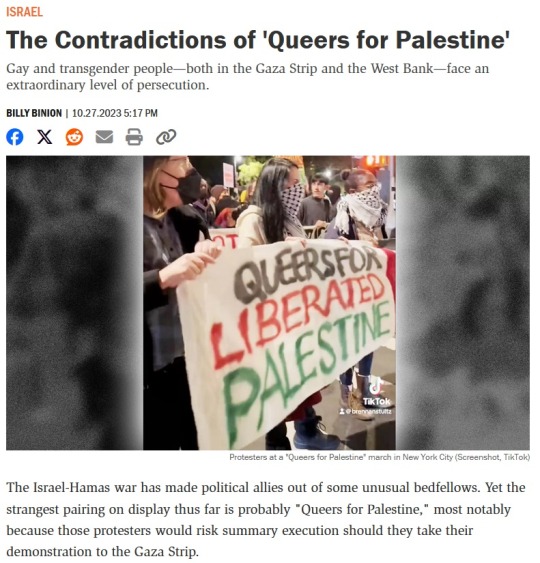
Meanwhile, gay Palestinians can get temporary asylum in Israel (please don't tell me it's "pink washing" again, when no one from the anti-Israel crowd will even acknowledge this fact) if they fear for their lives, it's just not a proper solution, because just like Palestinian terrorists can get into Israel, carry out an attack and murder innocent civilians, Palestinian homophobes can get inside as well, and murder the queer people who had fled here.
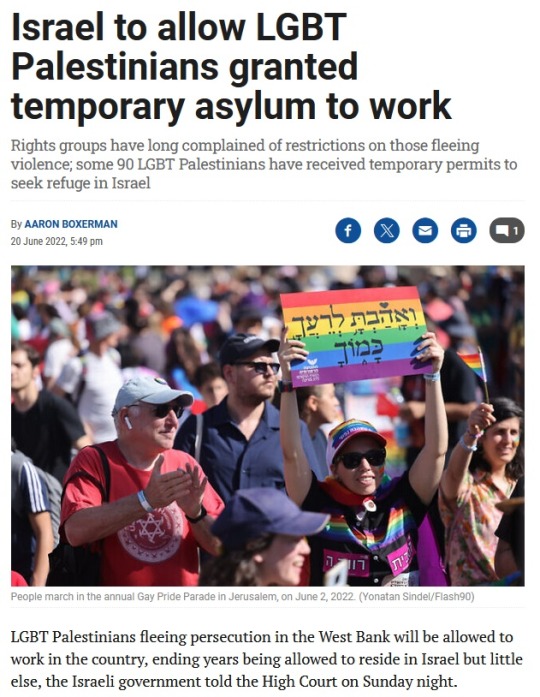
And just to make reality a tad more complex, you know how for the anti-Israel crowd, the worst of the worst of Israeli society, are the religious ("Fanatic! Extremist! Violent!") settlers? I know of more than one case where those religious settlers are the ones who are helping gay Palestinians, but here's one that made it into the Israeli news.

Life is just not black and white, human nature is complex, Israel is a country where human beings are more than just their stance on the conflict and whether foreigners agree with it or not, and the "pink washing accusation" black and white washes all our colors away, trying to reduce us into caricatures that fit into their simplistic, reductive narrative, so they can go on playing "white/western/outsider savior" to the "poor Palestinians" without actually caring about many of the poorest, most marginalized ones.
This vid isn't a representation of all gay Israeli Arabs, but it's def a voice you will not see acknowledged on the anti-Israel side:
Happy Pride to everyone seeing us, all of us, Israelis and Palestinians, queer and straight, with all of our humanity and complexity!
(for all of my updates and ask replies regarding Israel, click here)
#israel#israeli#israel news#israel under attack#israel under fire#israelunderattack#terrorism#anti terrorism#antisemitism#hamas#antisemitic#antisemites#jews#jew#judaism#jumblr#frumblr#jewish
314 notes
·
View notes
Text
"After 50 years of resistance, loathing for queer sex, like loathing for gender nonconformity, remains powerful enough to make the lesbian and gay movement recoil, throwing up its gloved hands in scandalized horror at the sex for which it stands. The movement has never been able to escape some basic questions: How is it possible, for example, to claim dignity for people defined in part by sex, and even by the most undignified and abject sex? Is the demand for dignity, propriety, and respectability hopelessly incompatible with the realities of sex? Is it entirely unreasonable that so many gay men and lesbians have seen the demand for respectability as a false ethics, choosing instead to explore in defiance all the taboos of abject need and shame? What kind of politics could be based in such a refusal to behave properly?
I take these to be serious and tough questions. Too often, though, the response to them in gay and lesbian politics has been defensive and apologetic. Gay people, it is said, are not really so bad. It's just a few extremists giving a bad name to ordinary decent folk. And of course it is true enough that many gay men and lesbians have had little to do with the extremes of queer culture. They might be happily coupled veterinarians in a suburban tract home with nothing more scandalous on their minds than wearing white linen after Labor Day. Well, bully for them. The problem comes when it is said that this makes them more respectable, easier to defend, the worthier pillars of the community, and the real constituency of the movement--'the rest of us.' Through such a hierarchy of respectability, from the days of the Mattachine Society to the present, gay and lesbian politics has been built on embarrassment. It has neglected the most searching ethical challenges of the very queer culture it should be protecting."
-Michael Warner, The Trouble with Normal, 1999
342 notes
·
View notes
Text
MY FIRST TIME
I think every guy that is gay has that first time story when total sex finally took place. You would think that it is like some mystical amazing event. For me... it was NOT... it was just a day that it was not planned and it happened unexpectedly. It was kind of funny to tell you the truth. Whose first time is perfect or magical any way... Not mine!
I had a friend that ... well we jacked each other off a lot from when we were 13 until 15... I'd say 3 or 4 times a month. It was a thing. We had done some oral. Not a lot... it started oral but then ended jacking off. Neither of us could say we had had SEX with a girl though he wanted to. I didnt too much even though I said I did.
Well it was 1999. The holidays were in full swing and he didnt even so much as get a kiss from the girl he thought he loved. She didnt even get him a Christmas present... HA... i had already given him three. Not to brag...
His parents had this whole party at their house. He invited me and several others over. Food ... music... their house was decked out Christmas... shit... we barely had a tree up at our house and they had like 20. His mom was a freak. The night was full and fun. About 12 of us teens were there. It was not cold. hardly ever is in Memphis at Christmas. We got in their hot tub ha... Games... more food... but people started leaving. He asked me to stay. His mom said that was cool.
Eventually most were gone... his sister left with her guy... they were banging all the time... his mom had too much wine... she went to their room... His dad was crashing but managed to get the garbage out which we helped with... we asked how late we could stay up...school was out... his dad replied ... I dont give a shit... LOL.... he was hilarious... i miss him.
We were still snacking on all the left overs. I said so movie or video games... he said games... We played games for a while. I actually had not thought about jacking off... which we did some as I said... he got bored and he rips his shirt and jeans off and said Im hot.... he had half a hard on... I said and maybe horny... he laughed... he said lets grab a drink... I said ok... he said take it off no one is up... I took off my shirt and jeans... down the stairs we went... I had sipped wine on occasions at my house who doesn't... he said let's sneak some... we went back up stairs with a couple bottles... drank some of the fruity stuff nothing heavy but I could tell it got me some...
We had barely ever talked about sex... between us... like ... maybe twice.... he drank... well more than me... and out of no where he said I want to fuck you. I was like WTH... seriously... he said yeah let's try... I mean ... I wanted to get off... wasnt expecting it... but I wanted to try... I just said ok but do we both do it... He said sure...
We had never... ha never done it... i should have been told how.. read some where ha... he did have lotion... that helped... but I laid down on my stomach and after he put some lotion on his dick.... he tried to push in... took us too long really but he finally got in and it burned and hurt like HELL... if he barely fucked me it hurt worse... ha... I still laugh at us... he said it felt amazing... I bet sooooooo
He thrusted some into me and he said it felt so good he couldnt hold off... I was like ok... he might have... might had pushed into me 25 times and he went... it was pretty obvious the event had happened cause I could feel it... he breathed hard... said it was great... well it wasnt for me... haha but it happened...
He lay there a min and said ok I know you want to try. Honestly I wanted it so bad... so well... i did what he did... and he felt like I felt... and since I knew he was not enjoying it... i didnt take long either... I mean I still remember how tight it felt... I barely could move inside of him without cumming... I was so horny... it just went without much movement... he was like SHIT PULL OUT.... i let it go then pulled out...
It felt great... we lay there quiet... I remember laying there when we were done thinking... Im not a virgin any more... So I finally said it... we lost our virginity... he laughed... he said you sound so solemn hahahaha but it was like a moment in time...I have never forgot it... I had had sex... with a guy...
His response was... I want to feel a girls pussy... all I could think was... I want to be with him again... well that time came .... I can tell you about it later... but... it got better ha... that first time... was horrible ha... later on... it made us so horny... we jacked off again... went to sleep and slept until 3 pm the next day... it was Christmastime... and it was one of the best ones ever....
95 notes
·
View notes
Text
Not long ago people attacked gay and lesbian people for being sexual predators. These days the same arguments are used against trans people.
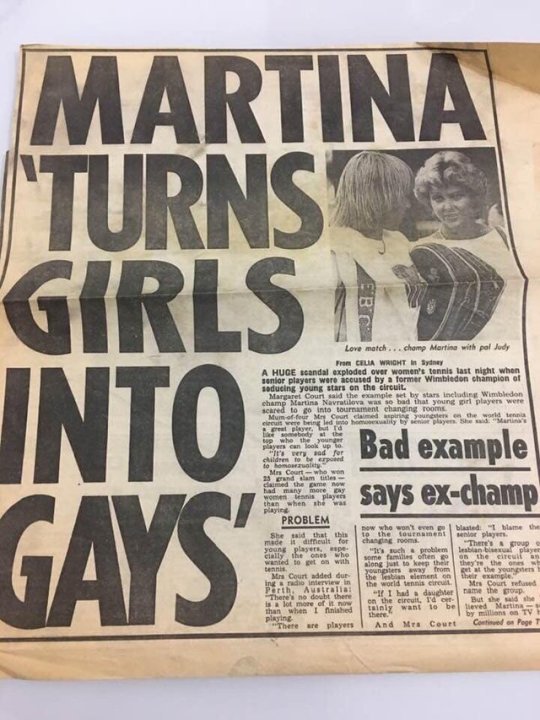
Right wing extremists and left wing “trans-exclusionary radical feminists” (TERFs) are arguing that trans women are a threat to cis women and children. The tactic is to sexualize transgender people, reducing their gender identity to some kind of perversion.
This is not in any way a new tactic, historically. It has been used against feminists, people of color and gay men and lesbian women.
So, you might ask why lesbian are using the same tactics against trans people, as straight, cis, people used against their kind. They have clearly learned nothing from history.
Over at twitter The Implausible Girl has collected a wide variety of newspaper clippings documenting the arguments used against gay men and lesbian women. I will present some of them here.
The Cult Argument
One typical argument used about trans people is that they are part of a cult that uses propaganda to harm cis people. The same argument was used against gay people.

The Baltimore Sun (Baltimore, MD) 1997-07-20
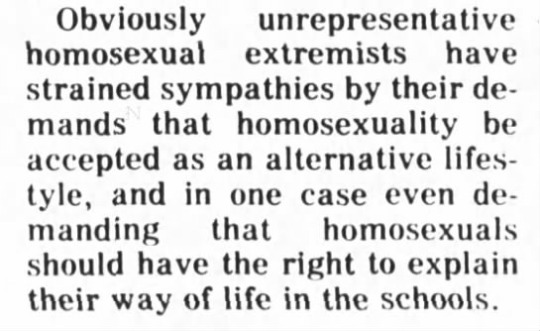
The Baltimore Sun (Baltimore, MD) 1997-07-20

The Signal (Santa Clarita, California). 1999-01-15
The Criminal Myth
In the same way trans women are presented as criminals these days, gay men and lesbian women were considered lawless in the 20th century.
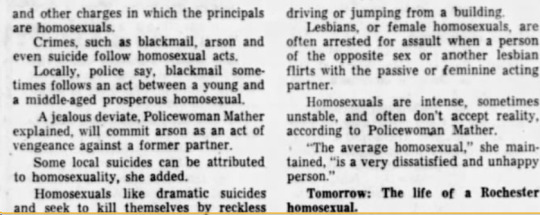
Democrat and Chronicle (Rochester, NY) 1964-03-15
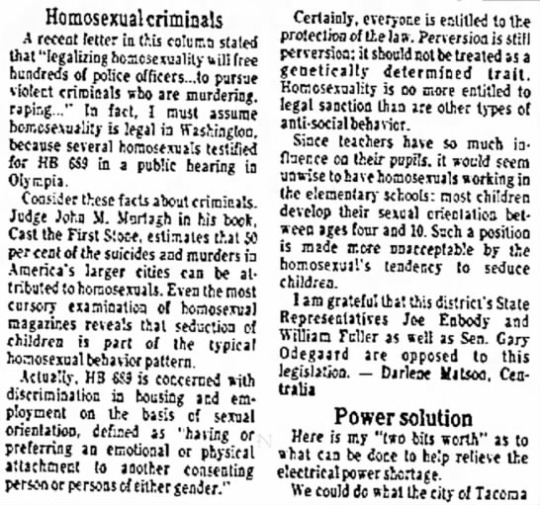
The Daily Chronicle, 1977-04-12
The Deception Myth
The fact that gay men and lesbian women were forced into the closet by transphobes, was used against them by the same transphobes. They were considered deceptive and dishonest. The same applies to trans people today.
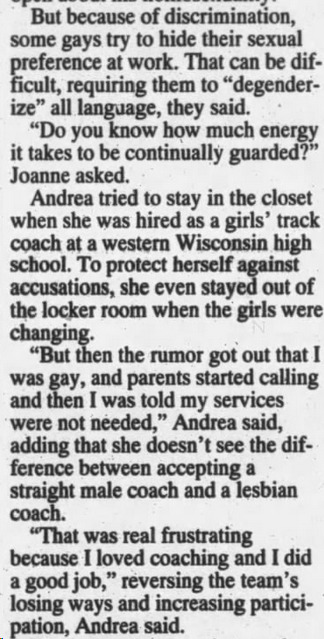
Leader-Telegram (Eau Claire, Wisconsin) 1993-12-03

Hartford Courant, 1997-06-14
The Oppressor is the Victim Myth
When gay men and lesbian people fought for respect and acceptance, their straight oppressors immediately presented themselves as victims. These days lesbian TERFs spread the lie that the trans cause is weakening the lesbian cause.
The argument that “gender ideology” threatens religious liberty is the exact same argument as the one used against gay and lesbian people in the 20th century.

The Indianapolis News 1974-04-20
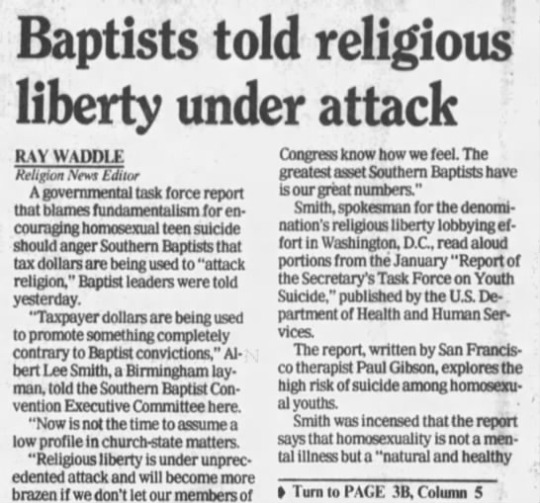
The Tennessean 1989-09-20
The Trender/Fad Myth
These days we are told that trans kinds are victims of a fad. They are “trans trenders”. The exact same argument was used against gay and lesbian people.

The Coos Bay Times, 1956-10-04
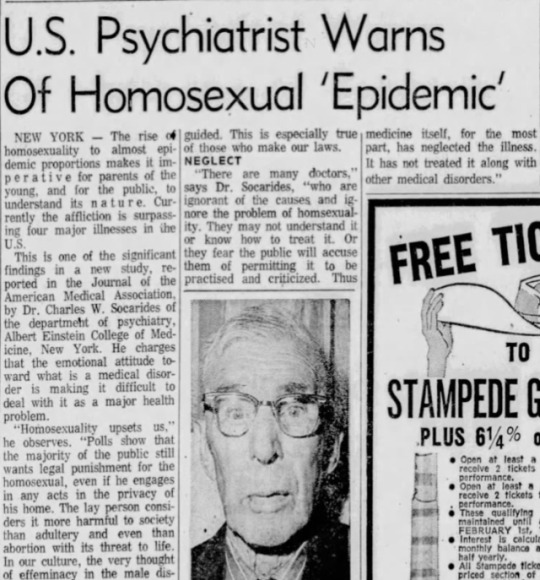
Calgary Herald, 1970-06-13
The Sexual Predator Myth
Female rebels used to be called "sluts” and “nymphomaniacs” by the servants of the Patriarchy. Black people had to use separate bathrooms in South Africa and the American South, to “protect” white women and children for irrational, hypersexual, black men and women. Finally, lesbian and gay people were considered part of an evil conspiracy aimed at turning “decent kids and women” into sexual deviants.

The Courier-Journal (Lousiville, KY) 1975-10-25
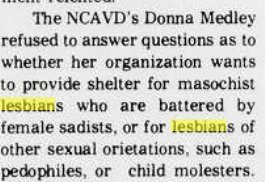
Carrizozo Lincoln County News, page 4 1985-08-01
The Binary is Common Sense Myth
People who know little about science or the diversity of religious beliefs seem to think that the sexual binary (we are all born straight) and the gender binary (biological sex equals gender identity) are self evident. Moreover, they think this dogma is supported by science and religion.
Lesbian TERFs, who are themselves victims of this nonsense, are now using this argument against trans people.
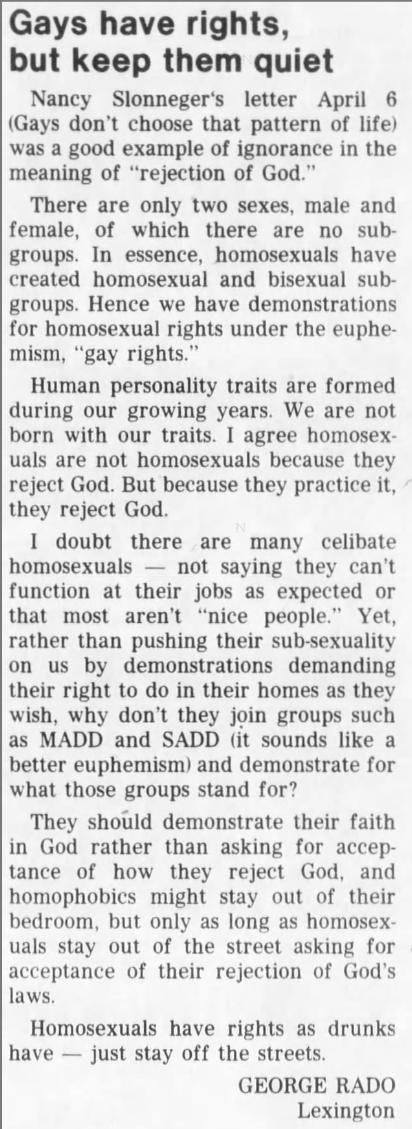
The Pantagraph (Bloomington, IL) 1986-04-24
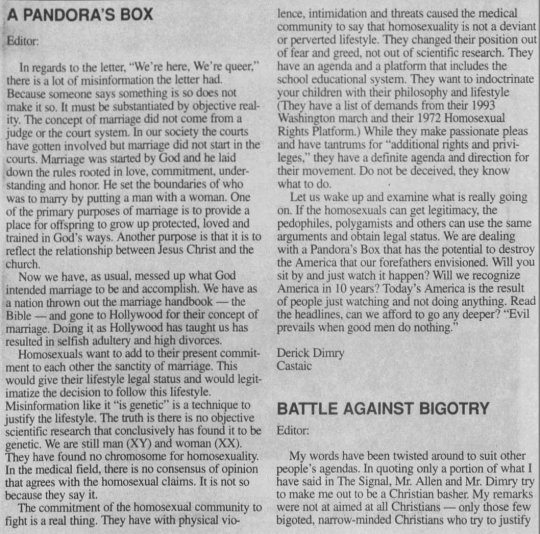
The Signal (Santa Clara, CA) 1996-08-13
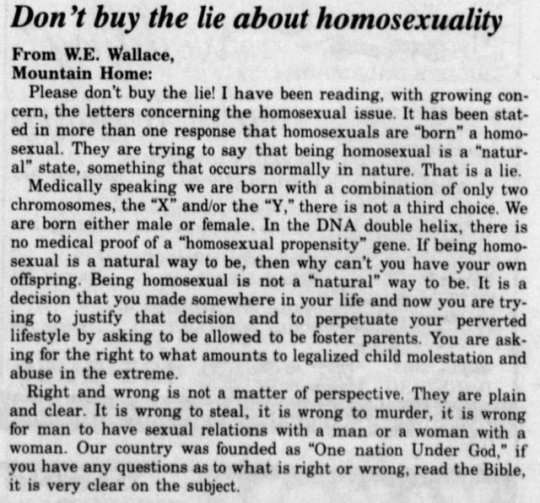
Baxter Bulletin (Mountain Home, AK) 1999-03-09
The Free Speech Argument
In democracies oppressors have always hidden their bigotry behind the free speech argument. Apparently they think that free speech legitimizes hate speech and violence. For some reason the argument for free speech is not applied to their victims, gay or trans people.
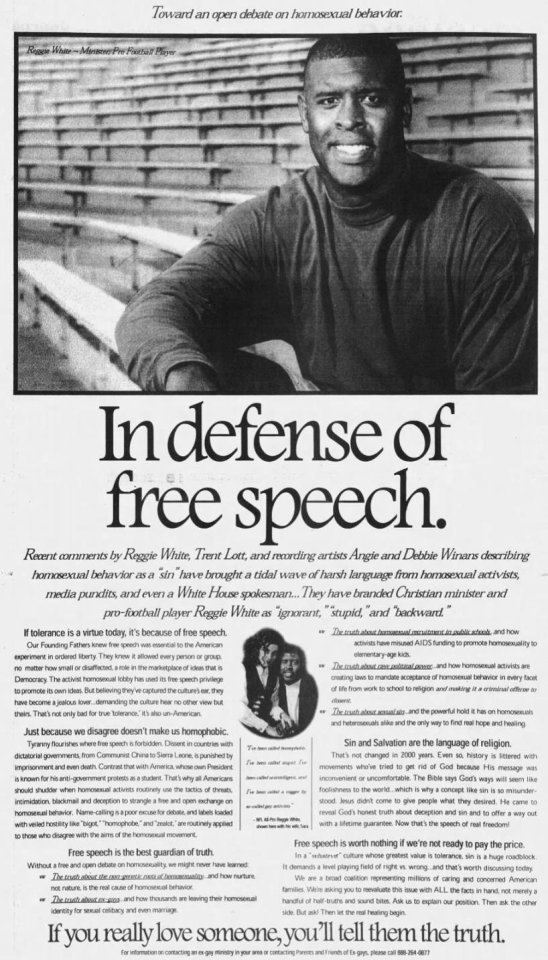
Enterprise-Journal (McComb, MI) 1998-10-11
Keeping Lesbians/Trans Women out of the Feminist Movement
TERFs want to keep trans women out of the feminist movement. It wasn’t that long ago, straight feminists wanted to exclude lesbian women from the feminist movement.
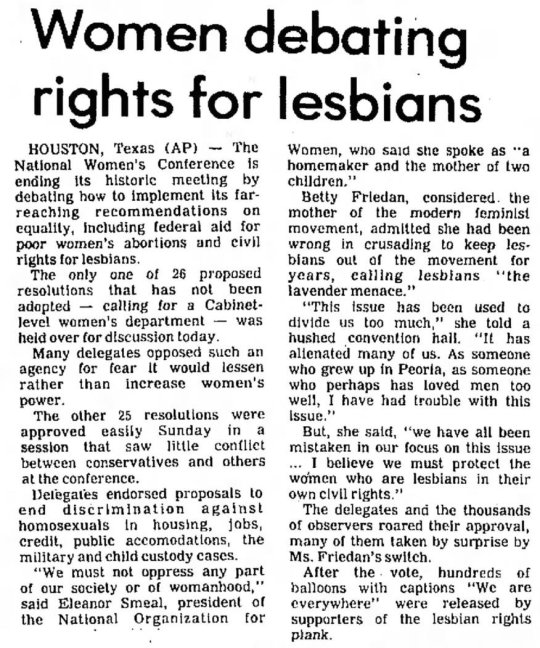
The Bee (Danville, VA) 1977-11-21
To conclude: The current transpohbia is driven by the exact same kind of prejudice as homophobia, with the transphobes using the same stereotypes, the same narratives and the same kind of fear mongering.
More clippings here.
#transgender#homosexual#trans#nonbinary#transphobia#homophobia#politics#lgbtq#lgbt#history#queer history#queer
153 notes
·
View notes
Text
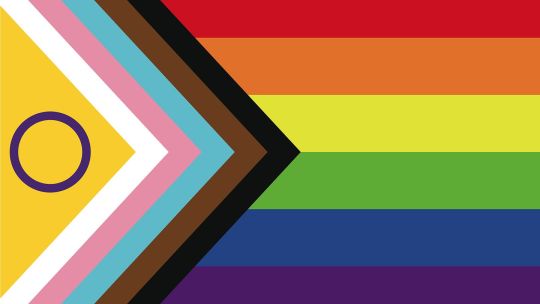
Since today marks the 53rd year since the first Pride parade took place, let's dive into the history of the "progress" of our Pride flag.
This new flag is called the Intersex-Inclusive Progress Pride Flag, created by Valentino Vecchietti of Intersex Equality Rights UK in 2021. It is an update to the previous Progress Pride Flag created in 2018 by Daniel Quasar.
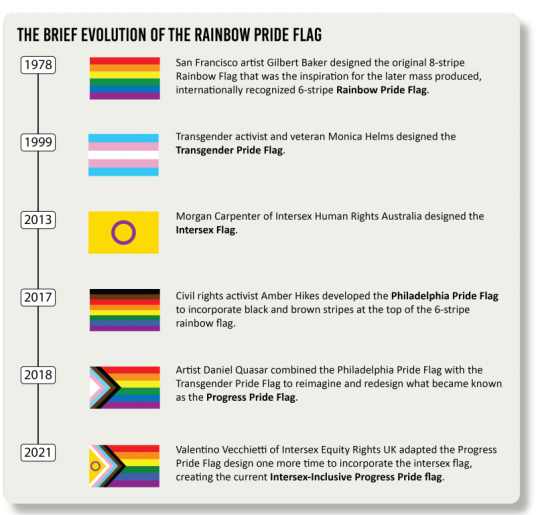
The original pride flag was created in the 1970s by gay activist Gilbert Baker, friend of Harvey Milk, the first openly gay man to be elected to public office in California. The flag made its debut at the San Francisco Gay Freedom Day Parade celebration on June 25, 1978. Baker used eight colors―

― hot pink for sexuality, red for life, orange for healing, yellow for the sun, green for nature, turquoise for art, indigo for harmony, and violet for spirit.
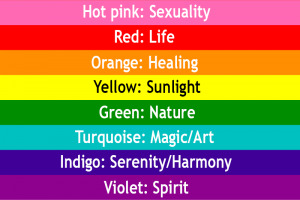
Why Was Pink Removed From the Pride Flag?
The original hot pink color was removed from the pride flag because the fabric was difficult to find.

The Progress Pride Flag was created with the inspiration of other pride flags—specifically, the Philadelphia Pride Flag from 2017 and the trans flag.
The Philadelphia Pride Flag had black and brown vertical stripes added. The trans flag, created in 1999, is pink, baby blue, and white. Both of these flags inspired the design of the new pride flag.
Black and Brown Represents People of Color
The Philadelphia Pride Flag was designed by the Philadelphia Office of LGBT Affairs and was done in partnership with advertising agency Tierney. It was introduced at a City Hall ceremony in June of 2017. The flag showed the traditional six rainbow colors in horizontal stripes, with a black and a brown stripe atop them.
The colors black and brown were added to the Progress Pride Flag to represent people of color (POC). This was an important addition because people of color have often been left out of the queer narrative despite being the driving force behind the movement.
With the rise of the Black Lives Matter movement, culture at large began to shift in a much-needed way towards acknowledging the vital roles that people of color have had in our society. The pride movement background is one of many areas where POC, particularly Black people, did not receive the recognition they deserved historically. Adding colors to represent them on the flag is one way to change that.
Additionally, the black and brown stripes are meant to represent people living with HIV/AIDS, those who have died from it, and the stigma around the virus that is still present in our society now.
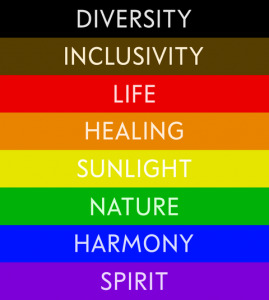
Pink, Baby Blue, and White Represent Trans People
Transwoman Monica Helms created the trans pride flag, which first flew in a pride parade in Phoenix, Arizona back in 2000. Monica Helms is a transgender activist, author, and U.S. Navy veteran.
Traditionally, the colors pink and baby blue have been used to represent whether a baby is a boy or a girl. Here, the colors denote those genders. The color white represents people who are transitioning, intersex, or identify outside of the gender binary.

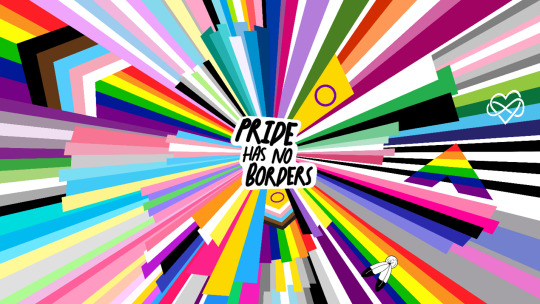
The word "progress" in the new flag isn't only about adding the new colors to it. It's also because of the shape, which differs from the original design of horizontal stripes only. The Progress Pride Flag shows the white, pink, baby blue, black, and brown stripes in a triangle shape, with the old six-color rainbow stacked next to them.
This was done intentionally to convey the separation in meaning and shift focus to how important the issues represented on the left are.
The placement of the new colors in an arrow shape is meant to convey the progress still needed. Quasar spoke publicly about how work is still needed in terms of POC and trans rights. This arrow design is meant to highlight that.

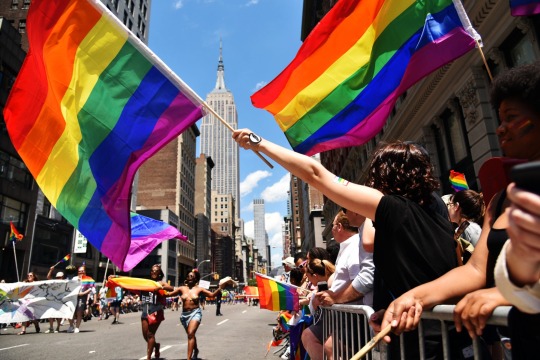
Although the Pride flag continues to evolve, the most recent update includes a yellow triangle with a purple circle inside it to represent the intersex community. It now serves as the most up-to-date LGBTQIA+ flag.
#lgbt#lgbtq#lgbtq+#lgbtqia#lgbtqia+#lesbian#gay#bisexual#transgender#queer#intersex#asexual#aromantic#non binary#nonbinary#pride month#pride#pride parade#june
223 notes
·
View notes
Text
IBO reference notes on . . . queerness
How has it taken me this long to write about this aspect of the show? (He asked rhetorically, staring at the enormous amount of fanfic that basically stands as a thesis statement on how very queer this part of the Gundam franchise is [as opposed to all the other terribly straight parts, he added, sarcastically].)
Anyway, let's do it. Full spoilers up to the end of the show will follow, together with discussion of child abuse and exploitation, since that is what IBO is all about.
Special thanks to @lilenui and @prezaki for their invaluable assistance in locating sources.
Statement of caveats: this work is an amateur analysis of the English-language localisations (subtitled and dubbed) of a piece of Japanese media. I do not speak or read Japanese. I am myself bi, which qualifies me to be attracted to more of the cast than the average viewer, and have a working knowledge of LGBTQ+ history in the UK and USA, which tells me nothing about the cultural and historical context in which this anime was made. As such, I will not be addressing the behind-the-scenes production or the corporate mandates surrounding it but will focus narrowly on what I perceive to be present in the text (hereafter meaning both the script and animation, and any additional fictional details provided elsewhere).
Queerness in Gundam
Some background before we dive in. To my knowledge, the first character in the Gundam franchise to be intentionally depicted as LGBTQ+ is Guin Sard Lineford from Turn A Gundam (1999). An ambitious young aristocrat who spends the series on the line between hero and villain, he is infatuated with protagonist Loran Cehack and the show makes little attempt to play this as anything other than one man falling in love with another.
This is entirely one-sided and not appreciated on Loran's part, although that seems to have less to do with it being homosexual attraction than with Guin's high-handed and entitled attitude to life, filtered through heavily gendered social norms. For plot reasons, Loran spends several episodes cross-dressing as 'Laura Rolla', corsets and all, and Guin continues referring to him as 'Laura' long after the deception is no longer required, saying it 'suits him better'. Guin is eventually called out on this by a third character, who accuses him of forcing an idea of feminity on the other man rather than stoop to place himself in the position of a 'wife'. Objectifying Loran is presented as of a piece with Guin's overall flaws as a person, to whit, putting his own views about how things should be above the material reality and desires of those around him.
Guin is also the only explicitly gay character in the show (I'm honestly not sure how to classify whatever Dianna Soreil and Kihel Heim have going on, but it's certainly not labelled in the text). Therefore no counterpoint is provided to demonstrate healthy queer relationships. I don't state this to dismiss his inclusion: he forms part of a smart, nuanced plot thread, and Gundam creator Yoshiyuki Tomino had to fight to get Guin's homosexuality clearly included. But even so, Guin is a palpable step forward rather than a watershed moment, and the end result veers close to some nasty stereotypes about queer people imposing their desires on others.
There are other examples of characters transgressing gender norms in Turn A, most especially Loran's aforementioned cross-dressing. He is comfortable playing the part of 'Laura', in ways that mitigate viewing this situation as the extended joke it might be in another production. Funny moments do come up – particularly in the lead-in to his 'debut' as he acclimatises to the female attire of the show's pseudo-Edwardian setting and takes posture lesson – but he and the concept of a man in ladies' clothes are never made a subject of mockery. The same cannot be said for the character of Sochie Heim, whose attempts as a young woman to fulfil a gung-ho masculine role often turn comedic. This is part and parcel of her assaying militaristic modes of action, which are soundly mocked across the board. It nevertheless stands out next to Loran/Laura.
Further, Loran's status as a literal moon-child carries implications for his attitudes. His dismissal of existing social standards on Earth is very much presented as correct, and in keeping with what I know of Tomino's other writing and stated beliefs, but it dovetails unfortunately with a treatment of queerness as otherworldly, not something that may be found among an average population. We get another example of cross-dressing in the next-but-one series, Gundam 00 (2007, not a work Tomino helmed), where the usually male-presenting artificial lifeform Tieria Erde switches to a female presentation (in a ball-gown, no less) during a covert mission. This sufficiently parallels Loran's case, I assume it was a deliberate call-back, being as it is a disguise enacted by someone even less typical than a boy from the moon.
What I am driving at is that while Guin, Loran and Tieria may be characters who are queer or perform queerness in some manner, they do not necessarily represent an outright embracing of queerness as a mundane facet of everyday life.
Fast-forward to 2024 and the latest mainline Gundam show is a lesbian romance.
If you have been following my blog for a while, you will know I do not hold The With From Mercury in especially high regard. I think it is annoyingly messy, frequently half-baked, and, broadly-speaking, exactly as frustrating as I'd expect from the guy who wrote Code:Geass. It's still an explicit love story that opens with a clangingly blunt statement about the acceptance same-sex relationships and ends with the two female leads happily married to one other. For all its flaws, I genuinely think the central relationship between Suletta Mercury and Miorine Rembran is a nice piece of story-telling, not to mention admirably open about what it is doing. Like it or lump it, Gundam is gay now, properly, with a protagonist and co-protagonist who can be definitively labelled queer and whose romance appears entirely unremarkable for the setting (in terms of being same-sex; clearly there is a lot to remark upon otherwise).
I would be remiss if I did not mention that the conclusion of the series was accompanied by a certain amount of corporate arse-showing, with hollow attempts to walk back the ending seemingly for the sake of appeasing homophobic elements within and without the companies that produce Gundam. The frankly laughable nature of these actions stands testament to how unequivocal G-Witch is. It is flatly impossible in my opinion to interpret as anything other than flagrantly homosexual, and that's great.
Between this interesting but limited start and the full-throated present lies Iron-Blooded Orphans (2015), my absolute favourite and the show that got me writing slash fic after years of… not doing that. So: what is the deal with queerness in IBO?
Natural for a human
By my count, including all present spin-offs, there are three characters stated in-text as being attracted to people of the same gender (Yamagi Gilmerton, Iznario Fareed, Deira Nadira), two who are at the least open to the idea (Norba Shino, Mina Zalmfort), two whose mutual attraction is stated within the context of polyamory with a third person of the opposite gender (Atra Mixta, Kudelia Aina Bernstein), one whose sexuality is briefly hinted at (Chad Chaden), and one male character who is possibly not attracted to women (Orga Itsuka).
Let's get Iznario out of the way first, because the less time we spend on the actual paedophile, the better.
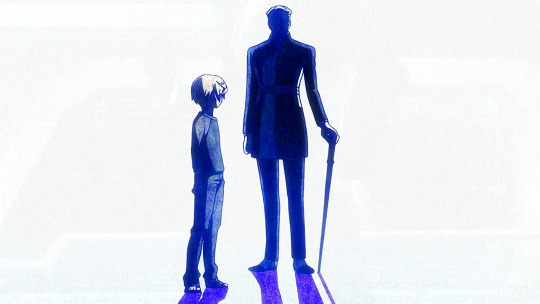
Lord Iznario Fareed is a rich, powerful aristocrat who sexually abuses young blonde boys and inadvertently sets large parts of the plot in motion as part of quasi-villain McGillis' backstory. In a lesser show, Iznario would be the embodiment of the 'predatory queer' stereotype Guin skirts the edge of. Here, however, he is very much not the only 'gay' character present and his proclivities demonstrate one of the many ways the world exploits vulnerable children, a core theme of the series. Early on, we see fleeting glimpses of young girls being pimped out on the streets of Mars. Iznario shows this social failing extends to the much richer Earth and although he is portrayed as the worst among the Gjallarhorn elite, they all abuse their power for personal gain. Thus, as much as the reveal of what he has done carries a certain shock value, it is not present purely for cheap impact. (This isn't the essay to discuss it, but the flashbacks to McGillis being abused as a child are a masterclass in how to frame such things around the victim, clearly communicating what's happening while avoiding gross voyeurism.)
I don't know how deliberate it is the canonical gay character who is shown in an entirely positive light fits the profile of Iznario's victims to a T, but it does underscore we're looking at a case of power allowing people to get away with hideous things, not a stand-in for queerness in general. To an extent I resent having to spell this out, since it seems so obvious Iznario is not fulfilling the role of a homophobic cliché. Sadly, the cliché exists and the point is worth discussion.
Moving swiftly on: Yamagi and Shino.
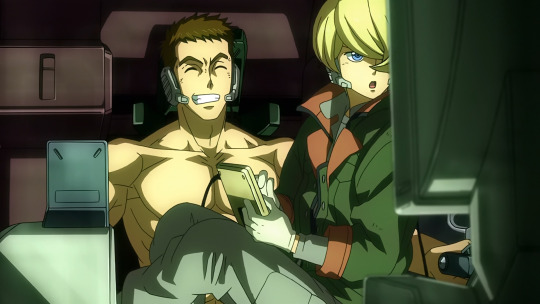
Yamagi Gilmerton is a small, quiet teenage boy with a somewhat withdrawn and acerbic personality, who spends much of Iron-Blooded Orphans nursing a hopeless crush on mobile suit pilot Norba Shino. Like the majority of the cast, Yamagi is a child soldier, but a mechanic rather than a combatant. Additional backstory commentary reveals that he struggled on joining CGS mercenary group due to his physique. Indeed, while this detail is not directly referenced in the anime itself, he is indeed drawn noticeably thinner than the other boys.
Again, we veer towards stereotypes, where a queer character is portrayed as weaker and more effeminate. Yet in spite of leaning this way in looks, Yamagi is an eminently capable person, never treated as lesser for fulfilling a support role rather than being a fighter. If anything, IBO goes out of its way to highlight how vital good mechanics are to mechanised warfare, and we see multiple examples of Yamagi being both assertive and kind of badass. At one point, he scales, unaided, an 18 metre tall mobile suit that's collapsed to its knees. When he and Shino are revisited in spin-off game Urdr Hunt (soon to be some form of animated production), he pilots a spaceship within an active battle-zone, flying escort for a damaged freighter as it retreats. In Season 2, he's comfortable ordering Tekkadan's new recruits around and is the first person to properly chew Orga out for his failings as a leader. Far from being an outlier among the protagonists, Yamagi is equally brave and dedicated to the cause, irrespective of his sexuality.
To be fair, he does tend to clam up and grow more awkward around the object of his affections. To be equally fair, he has the misfortune of having fallen for the most oblivious himbo on God's red Mars.
Shino is a big, boisterous warrior, the polar opposite of Yamagi in personality and physicality. He embodies Tekkadan's machismo, eagerly anticipating the chance to prove their strength and generally being a standard bearer for becoming the biggest, baddest group around. Things are not as straightforward as they seem on the surface, however. He shows a good awareness of when the group is in over their heads – going so far as to suggest retreat in the face of bad odds several times – and he is not nearly as sure of himself as he might first appear. He displays a wide streak of insecurity about his abilities as a soldier, reacting badly to people questioning his dedication or competency. And he crumbles completely when some of his comrades are killed as the result of a split-second mistake on his part, stating a wish to have died in their place. Thereafter, he acts in ways that read as choosing to take all the risks on himself rather than go through more loss. It makes him an interesting mix, someone who acts as a cheerleader, boosting everyone else's morale, while swallowing his own doubts and personal fatalism.
He is also presented as one of the most sexually active members of Tekkadan, using his wages to visit brothels to sleep with women. Indeed, he is frequently found extolling the virtues of the opposite sex, referencing collections of pornography (at least in the English dub), and generally being a very typical teenage boy about such matters.
Given this, you might assume Yamagi is longing hopelessly for a straight man. That is indeed the idea the show teases us with for much of its run (can something be straight-baiting? I feel if anything ever earned that title, it's this). OK, Shino's fond of Yamagi as a friend and frequently relies on his assistance in improving his fighting ability, and per ancillary material, is the one who got Yamagi transferred to the mechanics corps in the first place, rescuing him from struggling in the infantry. And sure, Shino spends an awful lot of time in very close proximity to Yamagi, including literally pulling him into the cockpit to assist with a mission. And yes, Shino is absolutely a flamboyant creature, sporting gold ear studs and an attraction to the colour pink, ensuring his mobile suits are painted all over magenta in order to stand out on the battlefield. And certainly, Shino is extremely empathetic, adjusting his attitude depending on his impressions of other people, such that he dials his boisterousness down in Yamagi's presence, displaying a far more gentle affection than he does with his other friends.
But clearly he hasn't noticed Yamagi is head over heels for him.
Right?
Well, towards the end of Season 2, during another moment where Yamagi is literally sitting on Shino's knee, Shino proposes the two of them drink together all night long once the fighting is over. Not only is this an unambiguously romantic overture (he's asking while pushing aside the fringe that normally covers half of Yamagi's face, in order to look into his eyes properly), it comes after a joke several episodes earlier in which Shino has to explain to a less worldly comrade that a girl inviting you for a drink is not a request to go out with the whole gang but a far more intimate gesture (I say explain, it's more expressing incredulity Akihiro didn't realise Lafter was asking him on a date). Later, it is revealed Shino did indeed work out that Yamagi 'likes' him (to his friend Eugene's exasperation that it took him so long to notice), and he reacted with amazed delight to discover there was someone in Tekkadan who'd fall in love with 'a guy like me'.

He'd assumed because Tekkadan is a family (a description provided by their ally Naze, which everyone just kind of runs with), romantic love wasn't possible between them. Having worked through this mental block and finally realised the blindingly obvious, he renews his desire to protect Tekkadan as long as he lives, refuting his previous view of himself as an expendable human shield and heading out with every intention of surviving all the way to the end.
And because IBO is an exquisitely-written tragedy, he is promptly killed while attempting a futile one-man attack against their enemies, his advances on Yamagi forming part of a long build-up whereby the boy who loves him provides the tools he needs to charge into a suicide run.
Right then. *drags out the reading comprehension soap-box* I have seen some people refer to this as an example of the 'bury your gays' trope, and there is nothing more likely to get me manifesting behind you in the form of an irate shoebill than to do likewise. 'Bury your gays' refers to a tendency for queer characters in fiction to disproportionately suffer tragic fates. This is a writing choice usually rooted in the idea queer relationships are inherently tragic, either because they are viewed as a perversion of 'correct' forms of love, or because of some misguided idea the prevalence of homophobia means queer joy is impossible. I am going to be charitable and concede this is indeed a case where one half of a budding homosexual relationship dies horribly. But, as always, the context matters.
All but one of the romantic relationships established prior to the epilogue of Iron-Blooded Orphans end in death. Of the two that survive in some capacity, one is a heterosexual background romance between two older characters and the other is a pair of women I shall be covering later. IBO is a story about child soldiers that does not shy away from the fact these are teenagers being fed into a meat-grinder. That the director's original intention of killing every named character was toned down (to the series immeasurable benefit, in my opinion) dos not change a narrative arc towards doom.
Within this, Yamagi and Shino aren't singled out for being queer. The coyness around Shino's eventually-evident bisexuality serves to generate an instant of hope and relief right before the rug is pulled from under everyone's feet. Where Shino's death does differ from those of other characters is in presentation: he dies alone and does not get any form of farewell or the passing-on moment afforded to others. But that is only to be expected, since we're talking about the point where it becomes clear there is no saving the situation. It's a cruel, abrupt moment of bad luck, puncturing the heroic idea of scraping victory at the last second. Shino flew out intending to live and he died anyway. A queer relationship forming part of what he was fighting for is an almost incidental detail.
(As an aside, I am aware of two other examples in Gundam fiction where a pilot and a mechanic have a doomed love affair. One is in Char's Counterattack, where a male engineer's romance with a female pilot ends with them both being abruptly killed, and the other is from Gundam AGE, where a female mechanic sacrifices herself for the greater good, leaving a male pilot to mourn her loss for the rest of the series. Shino and Yamagi reiterate this same concept.)
Stepping back from the tragedy, Yamagi's love for Shino is as delightfully underplayed as the other relationships in the show, with little emotional melodrama being wrung from the romance itself. Yamagi can't bring himself to declare his feelings, frequently turning cold instead and perpetuating Shino's misunderstanding of where they stand. Yet Shino ultimately proves enthusiastic for the idea, rendering moot any concerns Yamagi had over getting turned down (going beyond the text, a Q&A with the series' director confirmed Shino was written as bi). Equally, in the aftermath of Shino's death, Eugene comforts Yamagi by relating the truth of Shino's earlier realisation and even going so far as to rebuff Yamagi for implying there's something wrong with him for grieving. This and other interactions in the same episode imply those nearest to the pair were well aware of Yamagi's desires and had absolutely no problem with them. The prevailing attitude within Tekkadan is one of complete acceptance for its members and this is no different.
Indeed, for me, the most important part of how queerness is represented in IBO is that it is treated as just another aspect of the diversity of the cast. I've seen it stated that viewing homosexuality as a natural part of human existence was Tomino's motivation in making Guin gay. IBO presents us with the same idea, far more seamlessly and far more positively.
Now, let's leave the anime proper and look at the same-sex pairing from spin-off manga Iron-Blooded Orphans: Moon Steel.

Deira Nadira and Mina Zalmfort are part of the Gjallarhorn nobility and their marriage was arranged to strengthen relations between their two families. We see an example of a similar political match in the main show, where the heir to the Fareed family, McGillis, is betrothed to the second child of the Bauduins, the much, much younger Almiria. That this can take place regardless of the gender of the participants has big implications for the functioning of a bloodline-focused aristocracy. Presumably it indicates they are happy to use medical technology to ensure the Nadira family continues into the next generation, and if same-sex marriages are thus permitted, that means fewer factors to worry about when it comes to perpetuation. Whether male-male weddings are allowed too remains an open question; given the existence of real-world double-standards, it is possible Deira and Mina represent the only acceptable form of homosexuality. Nevertheless, that it is accepted speaks volumes. Gjallarhorn is not an especially progressive organisation, built as it is on rigid class structures and notions of human purity. Yet here we are.
Perhaps we should have expected that the norms around gender in this system don't correspond to strictly patriarchal patterns from the real world. Carta Issue, a key player in Season 1 of the anime, is the only child of the Issue Family's current leader and positioned as his sole heir, irrespective of the fact she's a woman. The logical inference is that any children of hers would count as Issues, rather than belonging to a potential husband's family. Deira is similarly the heir to her father's position, although intriguingly, it's not outright confirmed if she is his only child or simply the oldest. The possibility exists that gender is a non-factor in determining inheritance.
With respect to sexuality, Deira seems pretty obviously intended to be a lesbian. Her relationship with Mina is presented as one they are both happy with, despite it being an arranged by their parents, and Deira is depicted in the manual for Gundam Gremory's model kit as favouring the clothes of 'a handsome man'. She doesn't present that way within the manga' story, first showing up wearing the standard unisex Gjallarhorn pilot-suit, then wearing a formal gown for a meeting while in an official capacity. But she is depicted wearing masculine clothes in silhouette when initially mentioned and in a post-story panel at the back of the final volume.
(Another aside: the fan translations I use for this part of the manga refer to Deira using male pronouns when she's introduced. However, that could simply be down to the poor quality of said translation; she's consistently referred to using female pronouns in official materials and the game adaptation of this scene has her named as simply 'Lord Nadira', the standard appellation for Gjallarhorn family heads.)
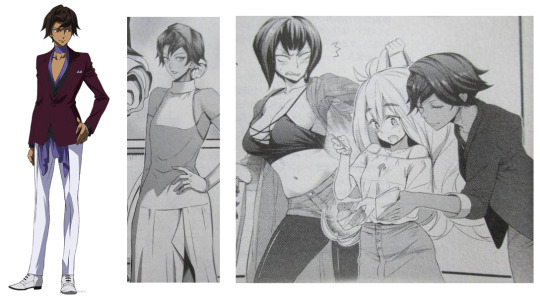
Whether Deira's code-switching is the result of institutional expectations around her role or personal preference, it adds extra texture to her depiction. While civilian garb was designed for the adult version of Carta and closely matches conservative gender expectations for a woman, she's never shown wearing it, so we don't have a point of comparison to judge what's required of a character in Deira's position.
Regarding Mina, you'll notice I grouped her with Shino rather than the characters whose sexuality I consider to be stated outright. With Shino, the nature of his sexuality is not put absolutely beyond question in the text. This is splitting hairs due to the overt nature of what's on screen but the fact remains, the anime doesn't clarify if his being open to Yamagi's love means he already thinks of himself as bisexual, or if this is something he hadn't considered before. With Mina, it's more a case that I'm unwilling to label her one way or the other based on the available information. Deira carries sufficient signifiers, I find little room for doubt over the intention. We also have an outright statement that she holds great affection for Mina regardless of being obliged to consider her an eventual romantic partner. Indeed, she becomes so upset by believing her fiance dead, she runs off to Antarctica in a Gundam. But the exact depth of Mina's feelings in return is not discussed.
In addition, Mina is considerably younger than Deira. McGillis and Almiria's match takes place when he is (probably) somewhere in his late twenties and she is nine, with plans for the union made four years prior. This is not great, to put it mildly, albeit fairly typical of how such things have historically worked for nobility. Based on appearances and how they are treated by the rest of the cast, I would assume Mina to be in her mid-teens, and Deira to be in her early twenties (annoyingly, exact ages are provided for several characters in Moon Steel, just not these two). A less dramatic gap (and I don't believe Mina is meant to be quite as young as her appearance perhaps suggests), yet still significant when one of the people involved is below what we'd consider adulthood.
There is no indication of anything untoward going on, within the confines of the situation, similar to how we're given no indication McGillis is abusive towards Almiria. Any comparisons with Lord Iznario's activities lie purely along the axis of how children are exploited by adults even without suffering directly. All indications are that Deira and Mina have made the most of something they have little choice in. Regardless, I still feel more comfortable describing Mina as open to being in a relationship with another woman, rather than pinning her to a specific preference.
Continuing the theme of things where doubt or ambiguity exist, let's discuss some characters were there shouldn't be any: Atra and Kudelia.
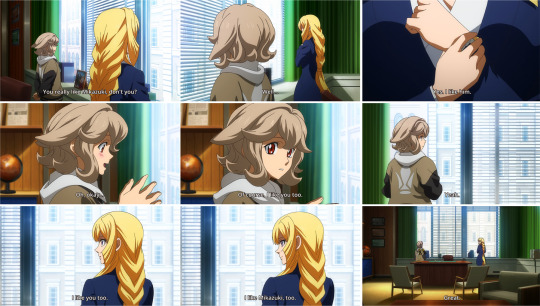
I don't know about you, but I find it extraordinarily hard to read this as anything other than a three-way love-confession. Still, in the interests of fair play, let's review the wriggle room for declaring this something else.
Kudelia Aina Bernstein and Atra Mixta are love interests of nominal protagonist Mikazuki Augus, in an iteration of another tried-and-true trope, that of a male lead inexplicably being attractive to the female characters in his orbit. Or rather, it would be if the show didn't take such pains to demonstrate why these girls fall for him, setting up a long-established crush on Atra's part (rooted in him being the first person in the world to be nice to her) and a mutual respect on Kudelia's that gets spurred to more when Mikazuki randomly decides to kiss her because she 'looked cute' (Mikazuki has the manners of a feral stray raised on the streets, because that's precisely what he is).
Justification aside, this has the makings of a traditional triangle, that is, one without a connecting base, which we might expect to be resolved by either Kudelia or Atra 'losing out'. For a few episodes, this does indeed seem where we are headed. Then Atra discovers the concept of polyamory via the polygamous Turbines group and all bets are off.

Having realised it is perfectly possible for a family to consist of multiple romantic partners, Atra proceeds to work towards ensuring everyone gets everything they want. Strictly speaking, this doesn't mean she is attracted to Kudelia as well – even if she clearly recognises Kudelia as an attractive person from the start and…
You know what? Acknowledging that the information about their eventual marital status was only stated in interviews at live events with no official record and seems to have been framed around raising the son Atra has with Mika, I'm going to abandon the pretence of both-sided objectivity and go straight for the throat. Turns out my patience for soft-footing this lasts about as long as it takes to say 'bi-erasure'.
Over the course of Season 1, Atra not only decides the end-game is some form of three-person wedding, she also:
Shows no jealousy over Mikazuki and instead chides him for not providing the correct emotional support to the girl he kissed.
Spends a great deal of time with Kudelia and enthusiastically throws herself into furthering Kudelia's goals, without necessarily understanding the technicalities.
Covers for Kudelia by pretending to be her during a confrontation with Gjallarhorn soldiers, getting herself soundly beaten up in order to prevent them from chasing after the real deal.
Drives an armoured car through a battlefield for Kudelia's sake, safely delivering her to a vital rendezvous.
Leaps in front of a massive mobile suit to push Kudelia out of its path, physically shielding the other girl with her body.
As much as it pains me to resort to the 'if this were a man and a woman, would it read as romantic' crudity – yes! Yes it would! Especially since in Season 2, Atra presents Kudelia with a good-luck charm bracelet she has woven, something she previously did for Mikazuki explicitly out of having a crush on him. I'm all for embracing platonic love (which is why Takaki and Aston are not featuring in this rundown) and there's nothing in the above list necessarily entailing attraction beyond deep friendship. But when Atra consciously repeats her actions towards Mikazuki (someone she goes on to definitely have sex with) with Kudelia and it leads to the scene between them where they declare how they feel about each other and Mikauki, looking for non-romantic angles takes more effort.
After all, if we are to read Shino's openness to Yamagi's affection from the things he says and how he looks saying them, we can certainly do the same for Atra and Kudelia's use of the word 'like' in reference to one another and their reactions to hearing it said of them. (Obligatory note that if there is some nuance in the original Japanese the translation doesn't capture, I'd love to hear about it. The English scripts, however, leave little to the imagination.)
It is indisputable that Atra feels a strong affection towards Kudelia and while I have been focusing on her a lot (she is by far the most proactive member of the triad), Kudelia reciprocates at every opportunity she is presented with. Even if there truly wasn't an intention to portray this as exactly equivalent to Atra and Mikazuki, the end result manages to be on par with Yamagi and Shino. Consider Kudelia and Mikazuki, for example. In terms of portrayal and the two-girls-one-guy trope being explored here, they have the same level of chemistry and the same absence of overt consummation as Kudelia and Atra, and it would hardly be a serious position to claim the show does not place the two of them in romantic conjunction, now would it?
You may at this point be wondering why I am getting so defensive of reading Kudelia and Atra as romantic partners. Honestly, I am too. On reflection, I think it's because IBO is playing around with such a worn-out and insipid means of wringing drama from characters who should know better, I keep searching for the catch. And yet there isn't one. This show really did respond to a nascent love chevron by having the mousy, homely girl tell the governor's beautiful daughter to shut up and get in the polycule, and turned it into a true triangle.
That's wonderful. I cannot properly express the wave of joy and relief that came over me when I realised this was the direction they were taking. It ends in tragedy, of course, Mikazuki giving up any chance of a peaceful life to die in battle, far away from the women who love him. But their lives continue because of his sacrifice and by all appearances they remain together. In some ways, for the overarching message of hope persisting on the back of heartbreak, the precise details of that arrangement don't particularly matter. So why not take the gayest reading possible?
What an excellent segue into a blink-and-you'll-miss-it, probably-stretching-too-far, nonetheless-compelling potential bit of queerness: Chad in the series epilogue.

One of the many tertiary characters in Tekkadan, Chad Chaden has minor speaking parts throughout Season 1 and a larger role in Season 2. He initially appears during a particularly dire early moment when it looks like everyone is about to be killed by attacking mobile suits. His obvious resignation to this fate sets the tone for a rather dour personality, at least while on the clock. Chad starts out as human debris, a person enslaved after a space battle and sold to the CGS military group as free labour. This gives him a very matter-of-fact attitude towards fighting and the kill-or-be-killed nature of being forced into it – he voices the sentiment that even when facing other human debris, they can't afford to show mercy.
Off the clock, Chad displays a more sensitive personality. He seems studious, learning about interplanetary communications from Kudelia's maid Fumitan and later being promoted to leader of Tekkadan's Earth branch. He has some difficulty acclimatising to being treated as a free person, proving unsure about the concept of wearing a smart suit instead of his normal fatigues. And he grows anxious when he returns to Mars to discover nobody told him two of the few adults in the group (Yukinojo and Merribit) had started dating, worrying that he's no longer 'one of the guys'.
The most we learn about his relationship preferences prior to the series epilogue comes in a comedic sequence about a third of the way into Season 2, when Shino suggests a trip to a local brothel. Eugene responds by proclaiming that he's realised money will not buy him true love. This prompts Chad to ask Merribit if this is true and, on her saying she supposes so, opts out of the trip as well. Judging by his body-language in the next frame where he appears, this is possibly a decision he regrets – perhaps owing to his anxieties, since he just passed up the chance for some team-bonding.
None of this is directly relevant to the topic of this essay. If anything, the scene I just described suggests that, like Eugene, Chad has previously gone along with Shino in paying for sex with women, only to discover he wanted more than just physical intimacy. But then we get the exchange in Kudelia's office during the last episode, following a time-skip after Tekkadan's defeat and dissolution. Now working for Kudelia as an assistant of some kind, Chad notes that Merribit is shortly to give birth to her and Yukinojo's second child, saying he and Yamagi intend to meet up later to plan a celebration. Eugene reacts with amused disbelief, accusing them of just wanting an excuse to go out drinking, to which Chad retorts, 'what's wrong with that?'
And the thing is he's blushing when he does. Which may simply be because Eugene is accusing him of slacking off – IBO characters blush all the time and their embarrassment is frequently to do with being caught acting immature or otherwise against how they want people to see them. But given the weight that 'drinking the night away' carries in regards to Yamagi following Shino's actions shortly prior to his death, it is easy to speculate this represents something more specific.
As far as I can recall, Chad and Yamagi do not interact at all over the course of the show's two seasons, meaning these lines present a rather unexpected combination of characters. Eugene would have seemed a more likely candidate to associate with Yamagi. He's positioned as Shino's closest friend, he comforts Yamagi over his grief, and they are together for much of the climax to the series' plot. So what has happened in the years since, that Eugene's teasing should elicit a blush from Chad instead?
If we put on our shipping goggles, it's far from a nonsensical pairing. Chad goes through an arc not too dissimilar to Shino's. He is knocked into a coma while protecting an ally from a bomb blast and subsequently the Earth branch gets swept into a war orchestrated by one of the factions within Gjallarhorn. On recovering, he blames himself for the many deaths that result, echoing Shino's line about thinking it better if he'd died in place of his comrades. On returning to Mars, he jumps head-first into mobile suit training, determined to make up for his perceived failure as a leader and cheering himself up through rigorous activity. Different though their personalities appear on the surface, there are clear commonalities here. Further, Chad's responses to his traumatic experiences have a more measured quality to them than Shino's. He is not nearly as reckless and provides clear directions to his comrades even while acting as a decoy against a dangerous enemy, rather than abandon any attempt to be an effective leader. Taken together, and coupled to a more long-term view of romance, these qualities might make him a 'safer' version of things Yamagi loved about Shino, creating space for them to be drawn together.
Or perhaps they're simply the most logical points of contact between the ex-Tekkadan survivors at the Admoss Company and Kassapa Factory and intend to make that an excuse to get companionably plastered for no greater reason than it being a nice time. I am speculating over a couple of lines and an animation choice. Nevertheless, it does not feel like unreasonable speculation. When we already have a veritable gaggle of characters who are queer or may trivially be read as such, it's hardly a stretch to assume one more.
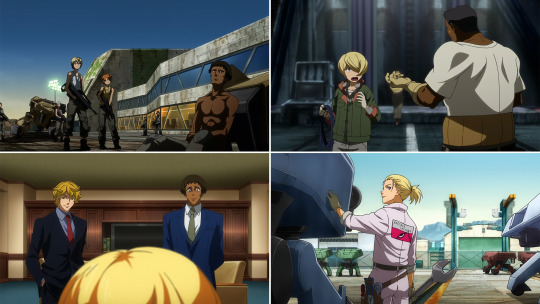
Chad/Yamagi doesn't appear to be a thread the fandom at large has pulled on much, likely because the pairing of Shino and Yamagi is so prominent, it eclipses a mere throwaway possibility. But I'm glad it exists within easy reach. And even if we take off our goggles, these lines demonstrate life for the characters has not stopped. The ex-slave and the gay kid are not stuck, trapped by the tragedies of their past. They have instead grown in both confidence and happiness and now have peaceful, stable lives where they're on going-out-drinking terms. That above all is why I wanted to explore this exchange: it reinforces Iron-Blooded Orphans' rejection of the idea the suffering people like Chad and Yamagi go through is perpetual or inevitable.
OK, one more character to look at. Let's talk about Orga and asexuality.
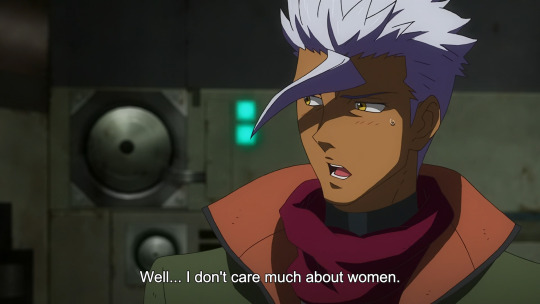
Orga Itsuka, leader of Tekkadan and instigator of the series' events, is notable for his charisma, his drive to provide a safe home for his comrades, and his complete unsuitability for the grown-up activities he attempts. Trying to party all night leaves him puking up his dinner. He forces himself into a suit and tie to handle the administration of a break-out paramilitary company, despite finding it stultifying and bewildering. His goals spin like a weather-cock, as he's surrounded by older characters possessing strong convictions while unable to stick to his own. And he is ultimately undone by an unwillingness to ask for help, having assumed that, as leader, he must decide everything alone.
I suspect his expressed lack of interest in women is intended to help convey overall immaturity. Orga is a good soldier and tactician, but he plainly isn't prepared for adulthood, lacking the grasp on the complexities of life that implies. Making him uncomfortable about sex serves to heighten the impression of a teenager trying to navigate circumstances for which he's not yet ready.
Relatedly, it should be stressed Orga stating he 'doesn't care' about woman is a response to Eugene asking if he agrees love and kindness are what's important, as opposed to Shino's endorsement of boobs. On hearing this response, Eugene proceeds to mock his commander for inexperience. That he himself has only just had his first sexual experience with another person and previously said much the same about not caring about sex simply proves hypocrisy is a fundamental aspect of Eugene's characterisation. The whole scene is very teenage.
Matters have not improved much when Orga and Eugene's dynamic is revisited in one of the side-stories released via the Iron-Blooded Orphans G mobile game. A year and change later, Eugene continues to act superior about having 'experience' where Orga doesn't.
Orga takes this rather poorly.

(Subtitles by @trafalgarlog)
Eventually Merribit has to shout at them to stop being brats, shaming them for behaving like argumentative children. It's funny – and then you remember they basically still are children and this is headed towards more carnage that will not spare them for being young. Such it is to engage with Iron-Blooded Orphans.
What does any of this tell us about Orga's sexuality? In principle, taking it as a device to convey immaturity, nothing. Orga's persisting virginity could simply mean he's not worked out this aspect of himself yet. He is a busy young man who likely hasn't had the time to try.
Alternatively it could mean he is gay. Mikazuki/Orga is an extremely popular ship in the fandom and we might take Orga's professed lack of interest in women as 'evidence' of him swinging the other way.
Or we could take my view, that Orga is asexual and his embarrassment is rooted in just not getting what the big deal is.
To immediately clarify, I don't think he is ace because he 'hasn't worked out what he wants', I think he's ace because he blushes on admitting he doesn't care about women and does not try to prove otherwise once he's in a position where he could easily do so. In circling back to the same joke for the side-story, the writers portray Orga as continuing to be uninterested in sex and sensitive over being needled about it. Again, a feasible interpretation is that he's into guys. Yet this is an argument with Eugene, whose response to the idea of Yamagi being in love with Shino is basically 'you mean you didn't notice?' Eugene is a dork and jerk; he isn't bigoted. None of the Tekkadan guys are. It's unclear if homophobia is even a factor in the setting. Sexism is, but when someone as superficially macho as Shino is comfortable with male/male attraction, and there are same-sex weddings inside Gjallarhorn, we cannot assume stigma exists around being gay. So why should Orga be worried, unless it goes beyond a question of who you're attracted to and into the answer being 'nobody at all'?
When you're surrounded by people who happily wax lyrical about how the joys of sex make you a real man, the absence of a libido might easily become a sore point.
Again, I'm supposing. Again, there is room to do so. As I touched on with Chad, it is easy to read queerness into the text when the assumption of straightness has been taken away, which is something this show does wholeheartedly and deliberately.
Orga Itsuka is one of the first characters I looked at and realised, not only shouldn't I assume heterosexuality, I shouldn't assume sexual attraction at all. I cannot credit Iron-Blooded Orphans alone with this. I do credit it with being a piece of media that applies itself to inclusiveness in ways quite remarkable for a show about giant robot fights, produced to market toys.
The word we want here is 'normalisation'. IBO has a lot to say about what constitutes 'normal' and a lot of it accords well with my own views, particularly those that have me twitching whenever anybody demands we 'be normal' about something. Normality is horrible. It is cruel and it is callous. 'Normal' is a world run on exploitation, on slave labour and on police savagery. Normal is children forced to risk their lives to earn the money required to feed themselves, because it is normal for their parents be gone, or incapable of supporting them. War is normal. Corruption of political systems is normal. Death coming more rapidly for those deemed expendable by society is very, very normal.
But so is protest. The drive to do something, to change things. The capacity for caring about each other. Love. 'Normal' is just a statement about what surrounds us every day, for worse and for better. In too many pieces of fiction, normality is narrowed, rendered a neater, cleaner picture, often excluding the kinds of people we might run into on the street, or walk past, or see on the news, distant and dehumanised.
Queerness is normal, yet for a long time it has been one of the first things to be cut out of fictional worlds. And when it is present, it's a big deal. An object lesson or a cry of triumph over breaking free of unfair strictures. I love stories about queer joy and victory. Heck, I'm a sucker for a good, soppy gay romance. But these aren't the only kinds of stories we tell. Sometimes we need to reflect the worst aspects of the world and what it does to normal people.
In attempting this, Iron-Blooded Orphans commits to an idea of 'normal people' that includes those who are gay or bisexual, those of colour and those we'd call white, the polyamorous, the illiterate, the desperate, the powerful, those who throw themselves into the fight with everything they have, and those who are simply kind. Those who are accepting, understanding and compassionate. Those who need to be accepted, who struggle to be understood, who suffer for a lack of compassion.
There are all sorts of people in IBO and – as a certain cheery, violent dumbass once said – man do I love it. I don't believe it is reading against the spirit of the thing to imagine more diversity than gets outright stated, to interpret one of the leads as ace or suppose another side character is bi or pansexual. It would seem entirely natural if they were.
Everyone's welcome here, down among the debris and the bloodshed, where hope is precious and fleeting and still somehow endures. So why shouldn't we raise a few extra pride flags?
Queer as in 'fuck you'
This all said, taken as a whole, Iron-Blooded Orphans is not a story about queerness or queer romance. Nowhere is this clearer than in its ending.
I skipped over the framing of the final scenes of the anime when I discussed Kudelia and Atra. They form a striking contrast with the ending of The Witch from Mercury, where the conclusion is directly focused around Suletta and Miorine's love for one another, their bonds of wedlock, and the happiness they have found together. This follows from the show being primarily about their relationship. In Iron-Blooded Orphans, the ending focuses not on Kudelia's feelings toward Atra, but those she has for Akatsuki, Mikazuki's son, with Eugene even saying she's eager to go see 'the man she loves', setting up a brief moment of uncertainty over who the character with Mikazuki's outline actually is.
The nature of Kudelia and Atra's relationship post-time-skip is implied rather than stated: in the English versions of the script, they do not refer to each other using terms suggesting they are married, although Atra has dropped her habitual 'Miss' from the front of Kudelia's name. They do not have wedding rings (redundant as those would be alongside the charm bracelets) and Akatsuki does not call Kudelia 'mom'. That they are raising him together is suggested very strongly, in line with Mikazuki asking Kudelia to be guardian of his child if he died. There are non-romantic ways of taking this idea, though, and none of these are closed off as viable interpretations.
But why should we expect some definite statement about romantic status when the point being conveyed is how Tekkadan's legacy continues to shape the world? This is a story concerned with the exploitation underpinning the world and the effort required to make even the smallest wide-scale change. It is about how people trapped at the bottom of the pecking order are still people, still human, messy and complex. It is about their pointless deaths, they ways they struggle on until those deaths come for them, and why they matter, even if the world forgets them.
Mikazuki, the living weapon, the human sacrifice for Orga Itsuka's reckless ambitions, leaves behind a child who will grow up in a more peaceful time, in a society slightly better off than when he and Orga were starving on Chyrse's streets. He doesn't live to see it; Akatsuki does. For all the failures, the attempt wasn't a waste. Don't you dare disrespect the people who died by saying it was.
This is where the epilogue centres, on Akatsuki and on Kudelia's cherishing of the world Mikazuki and everyone else built. Atra and Kudelia's relationship is there, a part of the gentler life they now have (Atra's desires were always towards the version of her existence where Mikazuki retires to a farm; here she fulfils the dream with Kudelia alone). It just doesn't need to take up space for the ending to land.
Yet, as I pour over how queerness is incorporated into Iron-Blooded Orphans, I find myself considering the struggles queer people face in reality. The victims of the AIDS crisis, dehumanised by indifferent institutions. Section 28 and the attempted destruction of knowledge around non-heterosexual forms of love. Riots and campaigns, voices raised loud and proud. How we are equated with dirt and corruption, reduced down to facts others find disgusting. The name-calling. The petty, pathetic posturing that makes everyday existence pointlessly harder.
So it goes for space-rats and degenerates alike.
I am lucky. My life is about as far from that of a child soldier as it is possible to get. My sexuality has been largely invisible. My gender matches the one most favoured by my society. I still have more common cause with those born in poverty on the other side of the world than I will ever have with the aristocrats and billionaires who shape the direction of my country. Because we hold many causes of misery in common. Because we share the same capacities for joy and suffering. Because our humanity is so easily cast aside by those we will never be able to touch.
There is always a place for stories uncomplicatedly about queer love conquering all. Equally, it is important to recognise the places queerness overlaps with stories about the many other ways the world casts people out. It is vital to be able to explore loss, futility and heartbreak. It is essential to capture why we strive onwards despite how heavily tragedy might weight us down.
We may be doomed. Our lives still matter. To ourselves, to each other and, whether they remember or not, to those who come after us.
So, no: for all the queer characters it contains and the many more we might trivially imagine queerness into, Iron-Blooded Orphans is not gay in the vein of The Witch From Mercury. It is not a happy story.
But it is a tenaciously hopeful one and, from certain angles, that alone looks queer as hell.
---------
Happy UK/US Pride Month – in honour and memory of Marsha P Johnson and everyone else who refused to go quietly.
I shall leave you with one of the least straight things ever to be included in any Gundam show.

[Index for further writing]
#gundam iron blooded orphans#gundam ibo#g tekketsu#tekketsu no orphans#gundam#turn a gundam#reference#notes#queerness#queer love#queer characters#analysis#spoilers#queer is a reclaimed slur and a term I apply to myself#heaven help you if you think this is the place to argue about that
36 notes
·
View notes
Text
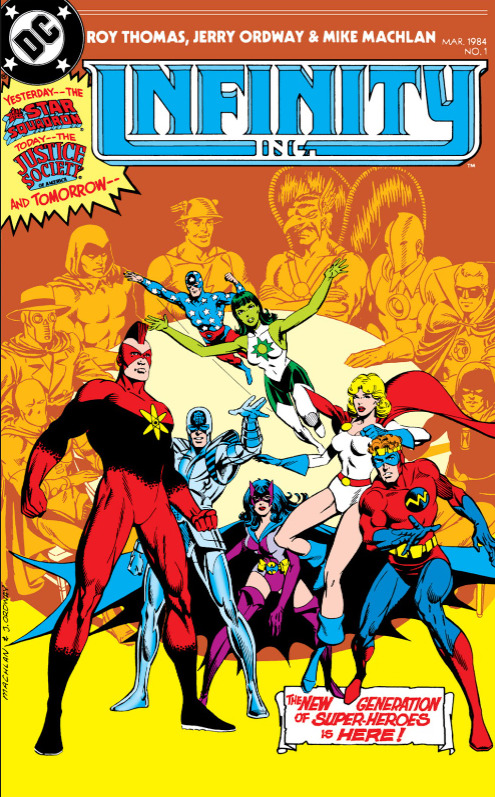

Okay it is Infinity Inc. propaganda time it is time to show off the niche kiddos
Infinity Inc. propoganda under the cut
The day is Christmas Eve, 1983, and the JSA are having their annual Christmas Eve meeting, and Hawkman (blissfully unaware that his family is about to come to him) suggests adjourning the meeting so that all of them can get back to their families, and Green Lantern (blissfully unaware that fate is about to kick him in the balls... TWICE.) retorts that he doesn't have a family, this is kind of dickish of Alan but like... it's ALAN lol. Suddenly, the old men are being tormented by waves of stupid children, all demanding to be allowed to join the team... and also one of their villains children doesn't actually ask to join the team but he does... for some reason go "when I am asking for help from my father's enemies, the thing to do is to illusion myself to look like my father, and then tear a hole in their wall, wait, why are they trying to arrest me?! RUDE!!! I am sulking now!"
Thank you for your input Henry.
Anyway, since the old men respond... somewhat reasonably to whatever the fuck that was, their kids decide to band together and make their own superhero team, where they get PAID! (less than minimum wage).
Infinity Inc. is an interesting team series that I mostly enjoy because of the characters, a lot of the time in team books the characters all feel the same, and are all at each other's throats constantly, Infinity Inc. presents the reader with characters who all have very defined personalities, even if most of them do share the character trait of "stupid", and by the end of the series you feel like you genuinely love all of the characters and want to spend more time with them.
DC notably decided that all Infinity Inc. characters should spend the next decade dying or going evil btw.
BUT THEN THEY GET BETTER. The Infinitors are kind of notable in that there are entire arcs of JSA 1999 where the old men try to rescue their kids, and all of them end up being considered JSA kids, including Hank who is being chased around the planet by Jay Garrick holding adoption papers (uncertain if this is continuing now that Jay has Judy tbh I do not trust Geoff Johns)

(context, Wildcat hits Hank with the 'kid of a supervillain' stuff well after he thought the JSA was fine with his general existance, my favorite scene because all of the Infinitors are instantly protective, and all of them give vibes of being really close, even if DC refuses to allow a full team reunion)
Honestly in my years of getting people to read Infinity Inc. it's notable that every single time someone has come out with a different fave, and I think it's a testament to the characters being really good, ESPECIALLY HECTOR AND LYTA who are JSA characters and NOT Vertigo characters and Vertigo shouldn't be allowed to stop them appearing in JSA comics.
Also the boys do this in hallways for unknown reasons
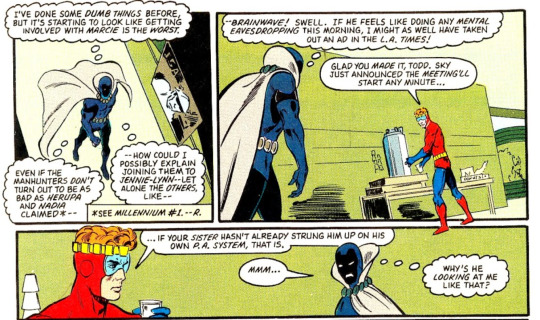

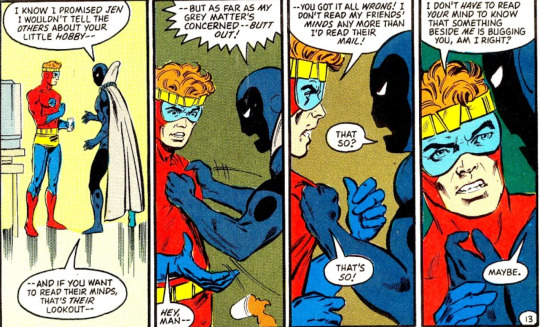

What was meant by this?:

Read Infinity Inc. today so you too can be convinced that Hank King should be the next character DC makes gay, unless they decide to do Norda first...
Tbh if I'm being honest they should probably just pull a Young Avengers and make every Infinitor gay.
50 notes
·
View notes
Photo

Adam Beales (Adam B)
Gender: Male
Sexuality: Gay
DOB: 11 October 1999
Ethnicity: White - Northern Irish
Occupation: Youtuber, actor, presenter
35 notes
·
View notes
Text
John Updike vs. Gay Literature
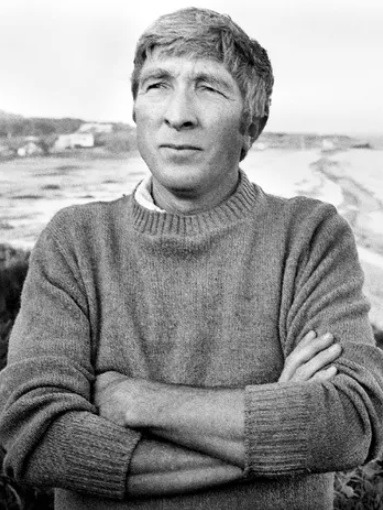
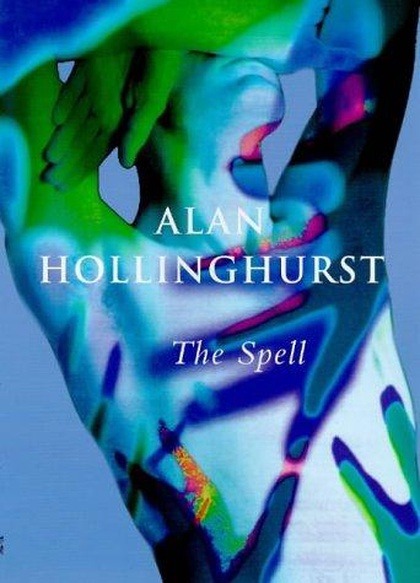
On May 23, 1999, John Updike published a review of The Spell in The New Yorker magazine. Written by Alan Hollinghurst, the novel is another of his tales of the gay underworld, an attribute that clearly displeased Updike:
The novels of the English writer Alan Hollinghurst take some getting used to; they are relentlessly gay in their personnel, and after a while you begin to long for the chirp and swing and civilizing animation of a female character. Save for the briefly and reluctantly glimpsed sister or mother, there are none.
Boredom swoops in without hetero clutter to obstruct its advent.
Novels about heterosexual partnering, however frivolous and reducible to increments of selfishness, social accident, foolish overestimations, and inflamed physical detail, do involve the perpetuation of the species and the ancient, sacralized structures of the family.
Perhaps the male homosexual, uncushioned as he is by society's circumambient encouragements to breed, feels the lonely human condition with a special bleakness: he must take it straight.
(Full review)
The backlash, as The New York Observer reported, was almost immediate:
“It really feels like an attack,” said Angels in America playwright Tony Kushner.
Writer and activist Larry Kramer circulated an e-mail alert among gay writers on May 31, with certain of Mr. Updike’s lines highlighted.
Novelist Sarah Schulman, who is a lesbian, said she wrote a letter to The New Yorker “the second I read the piece. It was so outrageous.” Craig Lucas, the writer of the movie Longtime Companion, also wrote a letter. “What he basically wanted to do is turn up his nose to distasteful sex,” he said. “This coming from the author of Couples! The idea that heterosexual sex is ‘sacralized,’ in his absurd phrase.”
Mr. Kushner thought Mr. Updike knew what he was doing. “I have a suspicion that he thought he was being cute and naughty.”
Mr. Kushner said Mr. Updike’s review “represents a kind of genteel tradition of disdain for homosexuals,” that has long been present at the magazine, going back to E.B. White and James Thurber.
So far, none of the letters have appeared in the magazine; New Yorker editor David Remnick didn’t return calls for comment. A New Yorker spokesman said, “It’s our understanding that Hollinghurst was not displeased by the review.”
Asked about the controversy, Updike seemed to miss the point of the criticism:
He said he had never read Mr. Hollinghurst before, and that when he did, this was his reaction. “As with all books that you are reviewing, you try to give your impression of the atmosphere within the book, which seemed kind of gloomy and pointless to me,” he said. “So I’ll just have to withstand whatever letters come.”
It’s not like he wanted to make generalizations about homosexuality. “I’d be happy not to discuss it,” he said. “Hollinghurst made it kind of tough. It makes it the unavoidable topic of discussion. It’s all about it. And for me to avoid his own emphasis would certainly be not doing my reviewer’s job.”
Colm Tóibín, another notable gay author, further bashed Updike’s views on homosexuality:
If you look at it carefully, that view of his will eventually eat into his reputation. Because his own elaborately confident and super-developed heterosexuality is actually an impediment to the proper writing and it eats at his sentences at times and it eats at his books… If you start reading Updike very carefully you start reading the astonishing boasting about sexual life which I found much more offensive than he does Hollinghurst’s book.
Years later, Hollinghurst himself spoke about the review:
Well, it was deplorable in various ways, but I also remember being very amused by it. There was this person who had gone to rather extraordinary lengths in his details of heterosexual sex and for whom the analysis of sexual behavior seemed to be so fundamental to his work as a novelist. But who was giving the impression in this review that everything he knew about homosexuality he gleaned from my novels, like he had never come across it in real life at all. I thought it was absolutely extraordinary, therefore so absurd, the old way he put it about the animating chirp of the female presence or something that he so missed in my books. It was terribly silly. It showed that he had chosen to emphasize his own failure with this large and interesting aspect of human behavior.
#john updike#alan hollinghurst#tony kushner#colm tóibín#literature#lit#gay literature#lgbt literature#lgbtq literature#history#gay history#lgbt history#lgbtq history#gay books#gay fiction#gay#lgbt#lgbtq#homophobia#books#booklr#1990s
15 notes
·
View notes
Text
My Policeman director Michael Grandage opens up about bringing sensuality to his intimate gay love story – and casting Harry Styles.
The story is essentially about class and sex. The intertwined lives of three young people in post-war Britain are played out in parallel with their 40-year-older selves. Longing and regret runs counter to youthful lust and ambition. The thread that joins it all up is the very British theme of restraint. I was born into an England where homosexuality was illegal. As much as I wanted the film to be both beautiful and moving, I also wanted it to speak to a generation who may not fully appreciate what life was like in our relatively recent past. And that notion of restraint, of how things were, needed to be present in every aspect of the film; from the look and score to the melancholia that younger Patrick (David Dawson) feels as a gay man in the 1950s.
When it came to casting the film, we started with the younger generation and Harry Styles was the first to come on board. We had a great discussion about the story and, from the way he spoke about the script and the novel it's based on, it was clear he understood Tom as a character. Emma Corrin was just emerging, as early photos of them playing Princess Diana in The Crown had been released but it hadn't actually come out. I met with Emma and it became evident very quickly they had access to so much of younger Marion's spirit. And David is an actor I've worked with a number of times in the theater. I wanted somebody who successfully conveyed a sense of period as well as bringing an internal life to the character.
Their older selves [played by Linus Roache, Gina McKee and Rupert Everett] followed quite quickly, making the whole casting process relatively straight forward. I knew I was looking for actors who would embody their younger selves without needing to look exactly like them. After all, we change so much. I look at photographs of myself when I was 40 years younger and I barely recognize that person. Certainly, there are a few moments in the film where young and older characters cross over. But that's an emotional memory of the past, whether it's Patrick thinking he is with a younger Marion or, later, with the Tom that he fell in love with. We all play with time differently and this film explore how memory and time are bound together.
Intimacy is a key motif in the film and most particularly how it is expressed through the hands. I wanted it to take on an almost sculptural feel and the sensuality of touch is a key element of the storytelling. That first touch of a finger brushing a neck, a secret touch of a hand at a concert, fingers gliding over marble, holding a cigarette, the washing of a hand as part of a ritual, hands digging into flesh at the height of male passion, or clinging on for dear life as a newly married couple navigate their way through something. It all represents a physical life to the film in bonds the characters together over 40 years.
The intimacy we see in the film between Patrick and something that others can now experience in the UK without fear of breaking the law. But the huge gains in creating a more open society around the world are beginning to feel fragile again - and I see this film as an opportunity to create debate. We watch the action in 1958 and 1999 through the prism of our own time; so, in a way, three periods come to life that offer us life that offer us the chance to explore how far we’ve come and how precarious those freedoms are.
via Curzon. (16 August 2022)
438 notes
·
View notes
Text
REVEALED: Obamas WERE On Martha's Vineyard When Chef Mysteriously Drowned in their POND: 8 feet of water
In a turn of events, it has been confirmed that former President Barack Obama and his wife, Michelle Obama, were indeed present on Martha’s Vineyard when their personal chef, Tafari Campbell, tragically drowned under mysterious circumstances. The Obamas, who own a massive house on the island, initially reported through their office that they were not at the residence when the incident occurred.
However, the narrative has since been changed, stating that while they were on the island, they were not at their residence at the time of Campbell’s unfortunate demise.
Campbell, 45, was discovered dead on Monday by divers after he went missing in the Edgartown Great Pond, Massachusetts. Campbell had been paddle boarding with another individual around 7:40 pm on Sunday. Eyewitnesses reported that he was dressed entirely in black and was not wearing a life preserver, a detail that has added to the mystery surrounding his death.
The DailyMail wrote:
Initially, the Obamas’ office said they were not home.
Their office clarified on Monday that they were on the island, just not at the residence when Campbell drowned.
The circumstances leading to Campbell’s death remain unclear, and an autopsy is expected to take place. As part of the investigation, a toxicology analysis will also be conducted, which is a standard procedure in drowning cases.
Campbell had a long-standing relationship with the Obama family. He served as a sous chef at the White House during the Obama administration and continued to work privately for the family after they left office.
Adding another layer to the mystery surrounding Campbell’s death is the fact that he had taken swimming lessons as recently as 2019. Reports have led to further speculation and questions about the circumstances of his death.
Campbell’s Instagram ‘Fitness’ highlight showed his dedication to maintaining his health, showcasing him swimming backstroke, freestyle swimming, logging a 40-minute swim workout on his Apple watch, and even bench pressing 315 pounds.
WATCH:
Campbell’s wife, Sherise, released a heartfelt statement on Instagram mourning the loss of her husband. She wrote, “My heart is broken. My life and our family’s life is forever changed. Please pray for me and our families as I deal with the loss of my husband.” The couple were parents to twin 19-year-old sons.
The staff at Edgartown Meat and Fish Market, where Campbell was a regular, also paid tribute to the chef, whom they remembered as a ‘wonderful guy’. “We saw him last week, he was such a nice and happy guy,” one staff member shared, adding that Campbell had been a customer for a few years and would often chat about what he was cooking.
Barack Obama's Chicago Man Country Friends:
November 17, 2007 Larry Bland shot and killed in his own home
December 24, 2007 Donald Young shot and killed execution style in his own apartment
December 26, 2007 Nate Spencer died in Chicago Hospital (AIDS)
November 14, 2011 Larry Sinclair, Obama's CHICAGO 1999 Bathhouse & cocaine prostitute involved in hit and run car incident
In 2008 Beau Biden & Joe Biden arranged to have Sinclair arrested for telling the Washington, DC National Press Club about his gay love affair and cocaine use with Senator Obama.
#barack obama#michelle obama#martha's vineyard#chef death#larry sinclair#larry sinclair died#norma jean young's son was murdered#donald young#larry bland#Nate Spencer#The Program#Trinity Church Chicago#Down Low Club at Trinity#Jeremiah Wright
74 notes
·
View notes